#because this part of you that is so fundamental to you is apparently incomprehensible to everyone else
Explore tagged Tumblr posts
Text
I like to headcanon Kakyoin as some form of queer because I think his backstory works really well as a metaphor for growing up closeted
#just. you know you are different from other people#in a way that's invisible and can be kept hidden#and you feel like no one will fully understand you#and you feel like you can't truly connect to your peers or even your family#because this part of you that is so fundamental to you is apparently incomprehensible to everyone else#and isn't even acknowledged#and you think there's no one else like you#it's so isolating#until he finally finds a group of friends who are like him (stand users I mean.. who are also queer)#I'm not actually too picky about what kind of queer he is#but I really like reading him as aroace#because I think it makes sense#and because he is my 2nd favorite
22 notes
·
View notes
Text
In Defense of Tearer
Character writing, not the uncountable crimes
AI:TSF Nirvana Initiative is a very divisive game, for many reasons, some of which I’ve discussed before even. With its twists and split storytelling, and a horrible no spoilers policy that leaves fans of the first game with no connective tissue that respects the time they spent with those characters in the first game, it was destined for controversy, no matter how many good ideas and interesting characters it contained. And make no mistake, Nirvana Initiative has many interesting, even consistently well executed ideas. There are some things in Nirvana Initiative that I think are better than they ever were in the first game, like the serial killer at the center of it all.
Apparently, Tearer is controversial. Some think he is lesser than Saito. Less presence. Weaker. Uninteresting. Irrelevant. They think his only purpose is to provide a motive for Amame, who is actually the interesting culprit. But I believe all of that is incorrect. It misunderstands what makes Saito compelling, what makes Amame compelling, and most importantly, for my purposes, why fucking Tearer fucking rules. Tearer is critical to the fundamental nature of not just AINI’s plot, but it’s themes; he is essential to the conversation about love, determinism, and trauma and without him this game is weak and flavorless, and all the other things you like about it would be worse. Under the cut.
Part Zero: S**TO
AITSF is about love. It’s in the title. Water is wet. But for the sake of drawing clearer parallels, let’s actually talk about Sejima Saito.
Saito cannot feel love or happiness from anything from murder, because of a brain disorder, or more accurately, he would have been able to if even one person loved him to begin with. I say this because Date exists within the same body, and he’s able to get by on medication. Because people cared about Date, and wanted him to be happy; they loved him. But Sejima Sou, the world’s worst man, does not care about Saito. His son killed animals, and he did nothing. His son killed his mistress, and he covered it up, but didn’t look into the root issue. He doesn’t care. On a literal level, Saito cannot feel love because of a brain disorder, but on a thematic level, he cannot feel it because no one ever offered it to him. He does not know what it is. (From this perspective, you could say that Saito is a victim of ableism and not only just. A problematic trope, although like it’s all definitely like still here)
And the sad thing is, Saito does not know what love is, he cannot understand it, yet he still wants it from his father! He’s on record saying this is why he killed Manaka because she stole him away. Sejima does not care about him, and he recognizes that, and it bothers him. He wants what he cannot have, so he kills instead. He has to rip that which his father loves away from him. That’s why killing her makes him happy! Are you seeing the bigger picture? The dopamine rush from killing is just the literal read; Saito derives pleasure from murder because he is ripping love away from others, a thing he wants but thinks he cannot have.
Saito switches into several different bodies that do not have the same brain disorder that his did, but this doesn’t make him understand love, because the problem isn’t actually the brain disorder. It’s that at this point, he has gone so long without ever being loved, without ever knowing what love is, with wanting it but never being allowed to have it, that he absolutely refuses to conceive of a version of himself where he could be happy and capable of it. He looks at Date, in his body, who is happy, and living a life full of love, with people who care about him, and its incomprehensible to him. That should not be possible. Date is using that body wrong because to be Saito is to be without love.
Saito has defined himself as loveless, as someone who could only ever be happy when he’s making everyone as miserable as he is. Sejima did not love him, and did not support him, but even once Saito became an adult with the resources and wealth that name possesses, he did not seek out happiness elsewhere, away from the people who failed him. When he gets second chances in different bodies, he does not seek out love, no matter how false it may be. Instead he uses whatever love someone might have for whoever used to live in that body as a tool to carry out his ends, because he is determined to stay as he is. He was not loved, so he will never be loved, and so no one else should ever be either.
This is how Saito is used in the narrative of the first game. In a story where love saves and redeems, about the connections we make with others no matter how fleeting, and the strength it gives us to pull through, the antagonist is someone who was denied it, and because he was denied it is now determined to destroy it for everyone else.
Now that we’ve laid the groundwork, by talking about Saito, let’s move to the main event.
Part One: Forsaken | Child
Carrying on the thematic torch, we get to AINI, and like with any sequel, the discussion about love has shifted. To simplify things, the discussion in the first game is “love good not loving bad.” Characters you’re meant to like are filled with love to give and are loved in return, characters who aren’t well...aren’t. It is good to love. I agree. But AINI takes this theme a step further: who/what do you love, and how? What does love mean to you?
This question shows up at multiple points. Komeji loves his family so dearly, but his pursuit of his dream he loves just as much keeps putting them in danger and costs him his wife and later his life. Shouma struggles to admit he loves his father, constantly fighting with him, until it is too late, and he’s gone, and there is nowhere for this love to go. At the cathedral Ryuki has to pick between Date and Tama: who does he love more? I could go on like this (we will get to Amame), but this all comes back to one source: Tearer. So, who does Tearer love, and how? What does love mean to him?
Tearer loves one person: his ‘mother’, Shigure Tokiko, the world’s worst woman. (I promise we’ll get to Amame when we fucking get there.) Like Saito, he is desperate for the approval and love of his parent, something he too does not get, but there are several fundamental differences. The first, and perhaps most obvious, is that while Sejima Sou is Saito’s literal father, and has not legally forfeit his parentage over him no matter how garbage and bereft of love he may be, Shigure Tokiko is not Tearer’s mother in any sense of the word. She did not give birth to him, she didn’t adopt him, she does not raise him with love or compassion—no. She and her partner/ex Horadori Chikara (the world’s other worst man) kidnapped him and keep him trapped in the fucking basement so they can harvest his fucking organs and body parts for their biological son they gave up but actually love, Furue Jin.
And as obvious as saying that might be, it’s actually pretty critical to begin here. Both of these environments are loveless. Sejima is implicitly neglectful, and I don’t like need to tell you what’s wrong with what Shigure and Horadori are doing, yet the results are fundamentally different. There are two reasons for this. The first is that Saito was always a Sejima, and his life began in a house without love, thus he never knew it in the first place, Tearer was once a little boy not unlike any other, happy, innocent, loved up until the day he was kidnapped. For a brief moment, he knew what love was, and that will always matter.
And this difference leads to the second, which is far more interesting to me. Saito decided that if he could not have love then no one could, that he would destroy every instance of it within his grasp with his bare hands out of spite purely because he could not have it and never knew it, and never once attempted to know it himself. But every single thing Tearer does is all in the name of love. He wants the world to laud him as a hero and savior, to recognize him as important. He does not care that he killed Komeji, or that he is going to kill billions of others, because from his point of view, he believes he is bringing them to true freedom. An act of service for humanity at large. This, as warped as it may be, is a version of love, and a request for reciprocation. He is obviously wrong to think like this, even if he himself cannot understand or comprehend it, but even if he somehow did, it’s secondary to his real motive, which again is for his ‘mother,’ who he loves more than anyone else in the world.
Everything he does, with the exception of trying to convince Amame of his totally based and epic gamer plan to wipe out all human life that also involved murdering her dad, is for her. That plan he came up with is based on her beliefs about the world that he dedicated himself to because she taught them to him, and he is devoted to her without question. Shigure may say that Naix is more scientific than a cult, and is thus better than whatever Horadori is doing, but Tearer is their #1 worshipper, and that is because he adores her. He wants to prove her beliefs correct, to brings everyone to Moksha, because yes everyone will love him and worship him as a hero obviously and his endless pain and torment will end and be retconned into having not happened, but mostly because it would make her happy to be right, and if he makes her happy, then surely she will love him in return, right?
Nonentity Incognito is a somnium about Tearer’s absolute desperation for Shigure to love him in the same way she loves Jin. He wants to be her son. He cries to be let out, somebody, “MOM HELP ME,” but she won’t, and no one else will. They take his ideas, his work, his organs, his skin—everything from him, while they leave him locked in a rusty cell in a basement with a door that cannot open from the inside, and yet he still cries from the bottom of his heart “I love you so much! Why won’t you love me? Why, mom, why?” But he knows exactly why she won’t. Because Shigure loves Jin, or at least she did at one point (she doesn’t anymore care much anymore given she’s all for Tearer’s plan that killed him). As much as he screams and cries and begs, she will never love him. She never has loved him. To her, he was just a child with the right DNA that could be used to save the kid that mattered to her. When asked if Tearer is her son, even when he is right there, she does not answer; the silence speaks for itself. Nothing he does will ever make her love him. He will never be her son, no matter how much he wants to be.
Some may wonder then, with this level of horrific abuse, why would he even want to? Especially since he hates Horadori and Jin for his torment, something that is no secret and is clearly illustrated within and outside his somnium. I mean he explicitly picks both of them as targets because he hates them that much. Horadori only tortures him, and Jin gets not only what Horadori takes but Shigure’s love, the one thing he wants, but why does he want it? Why does he want her love?
Part Two: Damned | Destiny
Shigure Tokiko has given Tearer exactly one thing. Not freedom, not remorse, not even a half-hearted apology, no she didn’t give him anything for his sake, but she did give him something. She taught him about her shitty cult ideology. Shigure believes the world is a simulation. Nothing is real, so there is no pain, and no sorrow, and no unhappiness if we just leave this false prison. She promises him that if he follows her, they can leave this fake world together, where true happiness, paradise, lies. . She does not tell him this because she feels sorry for him, it’s not for him, but because his obvious suffering is a confrontation of her guilt. He is in constant agony because they steal his literal body from him and keep him trapped in a dingy prison in the basement living off preserved food in a broken refrigerator, and if his torture is real, then she is culpable for it. It is her fault he suffers, so it cannot be real. This world where something this horrific happened, where she is enabling and partaking in something this cruel because she loved her son she gave up, Furue Jin—she cannot accept it. She promises him a world where he does not feel pain, and she does not feel guilt.
This obviously is just like shitty, and evil, which yeah, she runs a cult and kidnapped a child, of course she is shitty and evil, but he would not see it that way. To him, an orphan kidnapped overnight who routinely has had his organs taken from him by one of his abductors for another child who gets to be loved (or at least receives some approximation of it) instead, this manipulative bullshit looks like kindness. He’s so young. They took him when he was only six, and now this woman is promising him she can take him to a world where not only will he not be in pain anymore, but it will have never happened.
No one comes for him. He cannot escape. Even if he could somehow get the door open, they’ve taken enough of his lungs he has trouble breathing when he sleeps, so imagine every other physical challenge he could face in a body they routinely steal from. Of course, he clings onto her promises, her teachings; He has to believe her. What choice does he have? He just wants it not to hurt anymore! He is trapped in a cell, and she is telling him that they can leave it if they leave this world behind. He can be free. He doesn’t have to hurt. He will never hurt again. What she has to offer him is insincere, it is not helpful, and it is not even truly for his benefit (they even steal his work for Naix, insane, cant have shit in horaken), but who else is there to offer him anything? Shigure Tokiko does not and will never love him; she will never view him as her son. At most she sees him as a brilliant tool to further her agenda, a convenience as well as an organ donor, but he cannot leave. He is their prisoner, trapped, so her self-self-serving ‘kindness’ is the only thing he has.
They don’t let him go outside, cause obviously their unwilling organ donator can’t escape, and he’s only allowed to learn and do the things they think would be useful to them, (quantum mechanics, molecular biology, electrical engineering, Naix’ fucking teachings, etc), he has no friends or actual family, he’s lost his name, he’s lost half his face and body—what does he have that is his own? What can he have that is his own? What choices can he make that are truly his, when he has so little freedom? What else can he do?
This is where determinism comes into play. Because Nirvana Initiative is not just about love, it is about choices, and how those things often intersect and tie together: the things you do for those you love, the things you do to get it, how far you’re willing to go in its name. Tearer was willing to end the world in the name of Shigure Tokiko, because he loves her. He loves her because he has no choice but to love her, because in the situation they put him in he can make no choices at all.
When Horadori Chikara and Shigure Tokiko made that decision to abduct the child with the right DNA to save their son from his half body tumors, they sealed that child’s fate. Their love, however warped it may be, damned him into being Tearer.
Regrettably for literally everyone besides Shigure, this means he kills people, takes people hostage, blows up a building, tries to commit world genocide, dresses like a clown, and all in all just kind of sucks and posts cringe 24/7. My poor little meow meow lmao. He is the principal antagonist of the game, even if he turns out to be fucking dead for half of it. This is in part, of course, because this fucking unhinged maniac has no hobbies outside of Zero Escape and vaporwave and designed all of his plans to work with or without him being alive, but like Saito in the first game, Tearer is also representative of an idea. You may have already figured out what purpose he serves already, but if not, I think it’ll become much clearer once we talk about how he affects the story as the antagonist.
Talking about every single detail in AINI would take too long and waste a lot of time, especially since not everything that happens in the game is ties back to the HB case (hence some of the controversy), so our purposes we will focus on the characters most affected by Tearer: Ryuki Kuruto and Doi Amame. Ryuki first!
Part Three: Fractured | Mind
Now, to be completely fair, ya boi Ryuki was already going the fuck through it before the half body incident even started. Ryuki’s became a psyncer because of a childish sense of justice he cannot let go of because of the horrifying way he lost his twin brother, who was hit by a truck in pursuit of a criminal and half of his body was crushed beyond recognition. It was his brother with the heroic dreams, Ryuki is just carrying the torch. While the localization uses a reference to My Hero Academia, in the original Japanese, his catchphrase is an Anpanman reference, a superhero show for small children. He wants to do good, he wants to be a hero, to help people, but those naïve ideals can be easily twisted by his trauma and his grief, most notably into a profound hatred of criminals.
So, imagine you’re Ryuki, it’s the time of year your brother died, and now there’s a serial killer going around killing people by leaving half bodies: how do you think that’s going to go? And yeah! It goes like shit! He makes mistake after mistake after mistake, he’s constantly dissociating, memory lapses, he’s vibrating with anticipating waiting for Tama to give him the okay to kill some guys he thinks are tied to the incident, Ryuki shoots an unarmed civilian because he thinks they might be Tearer! He cannot separate his trauma from the case! And frankly, how could he be expected to?
I am not going to lie to you and pretend that Tearer designed the half body incident to trigger Ryuki’s personal issues deliberately. He didn’t. That guy doesn’t go outside lmao. But like Ryuki’s brother, Tearer too has been halved, and so he halves Horadori and Jin as punishment for what has happened to him. What is his catharsis is Ryuki’s trigger, and this inevitably leads Ryuki right into his grasp to be used, where the real shitshow begins.
Tearer has sabotaged Tama. He will kill her if Ryuki does not do what he wants, and what he wants is for Ryuki to kill Date and deal with any other minor nuisances in the meantime. And Ryuki shoots Bibi with a stun bullet, even if it worsens Bibi’s heart condition, because he loves Tama. He cannot bear Tama being destroyed, no matter how much Bibi screams at him, no matter how much she hates him.
He is under Tearer’s thrall up through to the cathedral, and he has one job. Shoot Date. Shoot Date, and Kizuna and Tama and everyone else in the cathedral gets to live! Seems easy, right? Even Date says he should shoot him. But despite this. Despite everything, despite all that is at stake, he can’t. Ryuki cannot shoot Date. It is the guilt of having shot Bibi, yes, but he loves Date. How could he ever shoot him? How can Tearer ask him to choose between the two people he loves more than anyone else in the world? How could he ever make this choice?
He can’t, so Tearer makes it for him, because Tearer has been making his decisions for him ever since he took Tama prisoner. He blows up the cathedral, and Mizuki loses her eye, and Kizuna is paralyzes, and Date is ‘killed,’ and Ryuki never moves on from this. He spends the next six years drinking into oblivion, his PTSD worsening, unable to forgive, unable to forget, unable to move forward. When ‘Jin’s other half’ drops he throws himself back into the case, still a wreck, still hallucinating, still having manic and dissociative episodes, to the point he doesn’t even seem to know what year it is, often interacting with others like it is 2020.
You might remember he caught TC-Perge, the bioweapon Tearer had Horadori Institute make, but the literal elements of a text are never just literal. When Ryuki dissociates or he hallucinates, it comes in the form of glitches to the matrix. Tearer believes in simulation theory, because of Shigure. She and Horadori kept him imprisoned, and she taught him the world itself is a fake they must escape from. For him, this virus is an escape attempt, but like how cutting people in half is cathartic for him but triggering for Ryuki, TC-PERGE is his prison.
Tearer is dead, but it is what remains of him haunts. It lingers, it possesses, and it does not let Ryuki forget or move forward. Ryuki is stuck in place, in February 2020 during the Half-Body Incident, because since it kept triggering him he ended up trapped, forced to do the bidding of the one that reminds him most of his trauma against those he loves most. He is trapped in the time Tearer stripped his agency from him, used his love against him, and that love is now his cage. It has transformed into guilt.
Who do you love, and how? What does love mean to you? Ryuki loved his brother, to the point that he choose to live the live he should have had, to uphold his ideals of justice. For Ryuki, love is grief is trauma. It is a list of reasons for him to hate himself. Tearer only adds to that list. He puts Ryuki in the same place he is, unable to move, clinging on to your own self destruction. For Tearer, it is the Nirvana Initiative, and for Ryuki, it’s the alcoholism, and the self-loathing, and the belief he has to solve and fix it all himself or die trying because it is the only way he can possibly atone. He takes a bullet for Date, even after he gets the pep talk from them and told they forgive him, and the only way he can atone is by working together to move forward. It seems only by taking it does he find his way out.
Ryuki gets cured. He will heal from his gunshot wound. Tama is free from Tearer’s clutches, and Date is fucking fine, and Ryuki will be okay. There was a way out of this hellish nightmare Tearer put him in, and it did not involve making the villains and himself pay forever indefinitely, it involved forgiveness. It involved accepting the love offered to you, because it should not be a prison, but freedom.
But the other person was not so lucky.
Part Four: Choose | Correctly
Okay to just take care of this, Tearer thinks he’s thinks he’s in love with Amame, but what’s actually happening is he hasn’t like seen a human woman who isn’t his ‘mom’ for like two decades, and his maturity levels are out of wack cause of the human experimentation prison cell thing, so his hormones are just going crazy. I have nothing further to say about this aspect. It’s just sad, and a little gross, and it’s not interesting. We’re moving on.
Determinism and causality already haunt Amame before Tearer kills her father. Doi Amame is a girl split in two. Every decision presented to her, every choice she makes is logged deep within her heart and kept perfectly preserved in bubbles, and sometimes she takes them out and rotates them, let’s the light distort their colors into something new. What if she stayed with her father during the divorce? What if she worked a different job? Less hours? Part of her is always in the past, ruminating on what could have been if only she had done something different, maybe it would have been better. In that sense, she and Ryuki have a lot in common, and it’s also why Ryuki should have been the protagonist full time, but this is not that essay.
We will briefly have to talk about Komeji, the king of bad decisions. If there were ever a reason for Amame to be constantly thinking about the consequences of her actions, it would be looking at her dad and going “Jesus Christ.” He loves family dearly, but he consistently makes short-sighted decisions that sound great in the moment, but get him and the people he loves further in hot water. This is why he thought it was a great idea to blackmail the serial killer with the body he found and stole, cause he was wasted, and hey it’ll get him money which he can pay the loan sharks with and then his kids will be safe right? WRONG. SO WRONG DUDE. Guy was a hot mess, and he pays for it with his life.
It because of that Amame and Tearer meet. Amame hides Furue Jin’s left half in the freezer in Brahman, and she shows up at Studio Dvaita just in time for Tearer to be finishing up arranging her father’s corpse, although she does not know it’s his at first. Their fates are now inexorably intertwined. “I met the person of my destiny.” Amame discovers her father in the body-bag.
While Tearer develops a bunch of fantasies about her over the course of six years, because what else is he going to fucking do I guess, Amame grieves and mourns. Her pile of capsuled choices only grows with every minute of every day, and she spends more time looking at them. Thinking about them. Wondering which choice was the correct one. Maybe she should have stayed with her father. Maybe she should have told the truth and worked less hours to come home early. Maybe she should have comforted him when Furue Jin’s body dropped on Face to Faith, because she knew he needed it. Could she have saved him then? Would he still be alive now? Yes, Komeji was a hot mess, but he was her dad! She loved him! And now he’s gone, forever.
Maybe she could have made peace with that, had her encounters with Tearer ended there. While it would never be fair, or right, knowledge that Komeji never made good choices, and that it was another bad choice that lead him to Tearer could be made peace with. With a lack of specifics about what Tearer was even trying to do before or after her father got involved with his plans, she could fill in the blanks herself, tell herself similar stories like the what ifs she conjures because there are no answers to her questions. But that is not what fate has in store for her.
Amame gets a phone call from Tearer. He wants to meet with her, because he is convinced, for reasons we will get to in a second, that she will understand him. And Amame, although she knows she hates him, knows she cannot forgive him for what he has done to her father, knows she is plagued by the decisions she has made that she can never undo, she does not call the police. She does not tell anyone. She accepts his offer, and she goes. She just wants to know what he has to say, right? She just wants answers. Only that. Then she’ll leave. Finally, an explanation for why her father was killed.
And she gets it! And it’s the worst explanation she’s ever heard in her entire life! Simulation? Moksha? Nirvana Initiative? What the fuck is he talking about? Her dad died for this? She asks him if he remembers what happened on February 13th, 2020, the day her dad was murdered. She is trying to gauge if he remembers what he did to her father, if he even cares at all. And all he has to say is “That was the fateful day I met you.” Her father? He doesn’t matter. Komeji died because he needed a body to put at Misetan since Jin’s other half was never returned, and Tearer considers this entire thing a performance and a game. It wasn’t personal, like Horadori, or Furue Jin. It meant next to nothing to him. Her father died for no reason. He just moves on! He laughs! He’s blathers on maniacally about his plans to destroy all life on earth in the name of liberation or whatever, right in front of a woman whose dad he killed that he doesn’t remember or consider important!
He thinks she thinks this is super based, and that he’s like the smartest guy ever, and that he’s going to save the day, and that it’s an honor she is getting the chance to work with him, that she is considered intelligent and special enough to know about their ideals. Why does he think this? Is he delusional? Has he lost his mind? Well, yes, obviously, that happened like ages ago when they started stealing his organs and trapped him in the basement, but there’s another layer. Shigure Tokiko does not love him, but she only ever validated him when he supported her cult ideology, and his other relationships do not exist. She is his only frame of reference. He wishes to connect with Amame because he wishes to connect with another human being and be understood, and Amame was there, but he only knows how to do that through this shitty cult he is thoroughly indoctrinated in to the point he kills people and plans genocide for it, and with all that in mind, the result is inevitable.
It was bold of him to turn his back to her. She was never going to understand him. Enda Amame knocks him out with a wrench, drags him to the slicer, and kills him in the same way he killed her father. Another decision she can never take back. But she was not alone. Shigure saw her kill him, and now she is under her thrall. She has to move not just his body, but hers, or else her secret will get out. So she helps Shigure with her plan, to keep her secret, and lives the next couple of days quiet and somber, lost in her what ifs and her grief. She cannot bear this weight much longer. Not just her loss, or the weight of the secret she now keeps, but the ever-mounting regrets that began years ago.
“I did what was best for me! I don’t care if people attack me for it, I have no regrets! I have no regrets!” Amame cries at the end of Nightmare Irreconcilable, a Somnium that plays through each of her regrets, and the things she could have done instead. She wants so desperately to believe this, because while she can imagine going to see Komeji instead of Iris, or picking him in the divorce, she can’t picture not killing Tearer, even though her regrets all lead her to that point. Even though killing him did not bring her father back, but just took her away from her brother, and Gen, and her other best friends.
When Tearer calls Amame “the person of his destiny,” he is correct, but not for the reason he thinks he is. Before him, Amame’s life is full of people who love her, and of people who love her in return. Yes, her father is a mess, and the divorce was hard, but she’s okay. She has support, and she’s kind and self-sacrificing and a little eccentric, but that just makes her lovable. The choices she makes matter but they are not a fixation of hers. The world is open. She is free.
But that day in Dvaita, the world starts to close up. She is still loved, and she still loves people, and she’s still gentle and eccentric, but she’s starting to close off. Her dad’s decisions lead to the slicer. What does that mean for her? Was the world always so small? He’s gone, and there are no answers, just a hole that will never heal, no matter how much people love her, or how much she loves in return. The pathways for her get narrower and narrower and narrower, leading her directly to that dingy cell that seals her fate. And just like the man she killed that was trapped down there, she too is treated as another disposable tool by Shigure Tokiko, and is currently trapped in a cell, not unlike where he used to be.
To talk about Tearer is to talk about Amame because to talk about Amame is to talk about Tearer. They are direct responses to one another. Tearer was damned into being so at age six. His ability to choose, to love, to decide were all taken from him when he was stolen from that orphanage. And this monstrous cruelty contaminates everything it touches. Tearer desperately tries to escape to a world where his trauma never happened because it is all that he is, and like him she fixates on imagined possibilities where things are better, because the pain of her loss is too much to bear.
The world was available to Amame, until it was infected by him, by what he had no choice but to become. He killed her father, and although the world was still available to her, she was still free, she could not see it. All she saw was the past she could not undo, the family she lost forever, and the man who was to blame. For that one moment, Amame threw out all the love the world still had to offer her because she hated him more, and immediately regretted it. It’s the cycle of cruelty, of abuse, of trauma.
Conclusion: Trauma | Symbolism
This is why Tearer fucking rules, more than anything else. He is the embodiment of trauma, the breathing symbol of thematic horror the cast is trying to overcome. That’s why half his body is literally fucking chitin, a visual representation of the wounds that do not heal. That’s why his personality is entirely formed by the horrific experiences he had at the hands of Horadori and Shigure, and why everything he does is motivated by that experience, down to his fucking name! He was literally trapped because when you’re traumatized it often feels like you cannot move from where you are. He clings to Shigure and her idealogy because she stands for nihilism. She promises all those that enter her grasp that this world is meaningless and the only real way to find happiness is by ending it all: a death wish. He never leaves the narrative, even after he’s killed, and killing him cannot defeat him, just perpetuates the cycle. Amame only comes out of that even more traumatized, more guilt-ridden and horrified, it adds to her trauma. Trauma is not something you kill. His plan to kill everyone is to make people destroy themselves from the inside out, by ruining their minds so they cannot interact with one another without inevitably causing pain.
The only way to stop him is through unity and attempting to mend bridges, by process the things that hurt you instead of bottling them up. Accept the love that people give you. Embrace the opportunities that the world still has to offer.
Bonus: Somezuki Uru
You must have one question left. How come in this entire essay, I never once called him by his real name? I even pretended for a second he lost it forever somehow. Well, that’s because…Tearer is an idea, isn’t he? He is entirely shaped by the horrors forced upon him. Like I just said, he is trauma. We don’t know anything about Somezuki Uru, other than he was orphan, a normal boy, and honestly based on knowledge of Sejima’s cursed dick and balls, his brilliance in technical achievement as Tearer is probably an indicator of something significant going on in his brain that just isn’t to the same degree as cancer or the oxytocin deficiency. My money is on autism (source: autistic). Everything else we get is shaped by the horrors, and I just talked about those at length. But if I still have you here…
It is 1996, and tucked into his bed at Aioen orphanage, Uru wonders what tomorrow may bring? Rain or sunshine? Outside the open window, the moon that hangs high in the half-clouded sky has no clear answers. The breeze smells wet. Maybe it’ll rain after all. Didn’t Mr. Chieda get that new game for the computer….? That might be fun to try. He yawns. The breeze smells dry again, but he’ll worry about it tomorrow. This great big world full of possibilities isn’t going anywhere.
I hope the world you live in right now is kind to you. Thank you for reading this.
#nirvana initiative#ai the somnium files#ai nirvana initiative#uru somezuki#somezuki uru#kuruto ryuki#ryuki kuruto#amame doi#doi amame#hope.txt#my meta#aini#ai series#I HAD A LOT OF THOUGHTS ABOUT MY GUY#SO HERE WE ARE#as for that second to last paragraph#its up to you how you interpret it#be kind to one another#okay?
147 notes
·
View notes
Note
I find it kind of hilarious to remember that, because some of the things he's saying don't exist yet (or at the very least don't exist in Hisui yet, who even knows what's being created elsewhere, because apparently in Kalos they were technologically advanced enough 4000 years ago to create a doomsday device lazer and in current day they had the tech to literally turn Bill into a clefairy and back), canonically there have to have been times when he'll be talking to someone and briefly become nigh on incomprehensible to them. Luckily most of the time they just lose a word and can figure out what he means, like if he says he "lost his [???] of thought" or "a [???] always makes sure his passengers arrive safely to their destination" or whatever. Words like train, conductor, rails, engine, cab, car, etc. would mean nothing to them, but if he only uses one it's probably not too hard to skip over and still get his meaning usually. But then sometimes as you mentioned he'll say things where they understand all the words individually, but he says them in an order that makes them sound like meaningless word salad, like "full steam ahead".
If this was a case of 'Ingo is actually speaking unovan but a magical translator is making whoever is listening understand him and vice versa', then it might just try to turn those words into the closest comparison their language has (although that could cause problems if someone was watching how his mouth moved and realized that he's not actually saying what they're hearing). But if it's something that magically bestows the knowledge of the language into his brain, then there'd be times when there's no direct translation for whatever word he's trying to say so he just subs in the unovan one without even noticing, though idioms would probably still be translated despite not making much sense. And that's not even counting the things he'd reflexively say in unovan in that scenario, like his all aboard or Emmet's lines, where he could accidentally say a full string of words they can't understand.
Although, wouldn't it be tragic if instead of being a translator it just completely overwrote the language he understands, but his subconscious still remembers those words in unovan, so he could quote Emmet's lines before a battle, and they fill him with power, but he literally doesn't understand what he's saying. Why does he point to things and shout meaningless noises? Who knows, he just does, it feels right for some reason.
that last bit is like a perfect 50/50 split between completely tragic and so fucking funny. he's just making noises. he doesn't know what they mean either. but also it's because even this most fundamental part of who he his has been taken away, he isn't even allowed to keep that, and the memory of them feels like something broken in his mind-
and funnily enough i have actually had multiple different instances in wips where people will comment internally "sometimes ingo just says shit. and you just have to go 'ok' and move on and hope you correctly pick up wtf he means from context." like that's their guy! he speaks in riddles sometimes and they just nod like it all makes sense
8 notes
·
View notes
Text
Okay so I just drank a bottle of Belgian beer for the first time in ages which I hope is a suitable preface for what is to follow. I also have a confession to make: lately I have been swept up with watching NDE (near death experience) videos. 34+ years ago I went wayward from my born-again path, though some time after that phase when I was high on weed I would get paranoid that God was going to condemn me to hell if I died. I am of an older generation--self-identifying as gen-x although on the cusp with that and boomer--that has been largely exposed to scientific materialism, some of which was made manifest in the "cool crowd" spouting existentialism-isms like "life's a bitch and then you die" (which would sometimes be corrected in response to "life's a bitch and then you marry one", charming, isn't it?). I'm sure I have a point here, bear with me and I'll find it. Deep down I have never quite accepted that we just live our lives and then die and then rot in the ground, turn to food for the worms and that's it. It feels lately like I've discovered a new religion, only this one--at least for the time being--is not subject to dogmatic calcification. It appears to me to be more than a coincidence or some kind of snake oil side hustle that so many people being interviewed on these NDE YouTube podcasts share so many similarities in their stories. Also, some of these interviewees are scientists and academics and one show, "Next Level Soul" has a host formerly in the film industry who interviews a well-known producer also from the film industry who produced a film starring Robin Williams. Another interview is with a woman who is part of the current Artemis mission from NASA to re-visit the moon. Other subjects, however, come from many walks of life, as in a former drug addict and prostitute or a hospital nurse. Things get flaky for me, however, when there is talk of higher vibrations and "quantum healing," a term apparently coined by Deepak Chopra. It's as if everybody has an inexplicable knowledge of quantum physics. This said, I still want to believe. In a weird way it makes more sense to me than just dying and becoming worm fodder. The appeal for me lies in things like the afterlife apparently being free of judgment and that there exists there a love that is incomprehensible within this lowly 3D earthly realm. What I don't like is that there is a tittering council of twelve that is very persuasive in sending you back to the earthly hellscape because that's what you agreed to before you were born into your present life (which you still have to go back to because your work isn't finished and if you refuse you will be reborn into a new earthly life). At the very least it's a colourful landscape and one far more convincing, at least to me, than, for example, Christian fundamentalism. And really, what harm is there in having some sort of mythos permeating your existence?
So what follows is a few of the YouTube videos I've been watching lately. Drinking a beer and chilling out seems to be the best response. Rochefort Trappiste 8, if you're curious.
youtube
youtube
youtube
youtube
youtube
#you might have guessed that i'm the sort of person who will wade through trash to get to the good stuff#and some of you might not be holding your breath waiting for me to find it#that's okay#there's no judging in the afterlife#or so i'm told#Youtube
1 note
·
View note
Text
I've often wondered if part of it stems from a psychological need for there to be two distinct, non-overlapping categories of Good People and Evil People - and if you're part of the former, then luckily you never ever have to worry about being part of the latter; and if you're part of the latter, then I guess you're just inexplicably and ontologically bad for no reason. It's scary to consider that we are, in fact, nothing more than the sums of our choices - there is no core-good and core-bad - and that the responsibility to make the right choices and be good people lies entirely with us.
And I think this kind of worldview can lead to a need to continually insist on your own belonging in the Good Category by repeatedly distancing yourself from, showing you're nothing at all like, the Evil Category. And the need to keep reiterating your Goodness by emphasising the difference between you and the Evil People creates a further need to see evil as fundamentally incomprehensible and incapable of being picked apart and understood. The only acceptable way of dealing with evil is to keep saying “I just can't understand how someone could do that!” - which replaces a desire to understand with a reflexive need to distance yourself and protect your own moral image. Saying that you can understand where evil is coming from and understand the warped perspectives of people committing great evil, or even acknowledging that such a thing may be possible, is to admit a psychological similarity between you and the Evil People, and we can't have that because these groups need to be Totally Different With No Overlap. And thus you end up with people who seem to think that any creator who can believably get into the head of a truly evil character, write from their perspective, and put words into that character's mouth that explain their beliefs and actions must therefore have some of that evil inside themselves - because apparently explaining is excusing and understanding is justifying and empathising is agreeing.
But real moral maturity is the recognition that there is really very little difference between your mind and the mind of someone committing evil, and the only thing stopping you from becoming that someone is your own choices, not any kind of magical force that separates The Good and The Bad. There is so much evil in the world and we need to try to understand it; insisting “that could never be me! I have no idea how anyone could do that!” as if people who do terrible things have no internal reasons for them and are just being puppeteered by some nebulous satanic force gets us no further forward and only impedes any ability to actually stop or prevent evil. And in order to understand it, we need to stop insisting that doing so automatically equates to some kind of agreement or endorsement.
After actually reading the issue of beastars that everyone got mad at the author for and claimed she was a supporter of fascism about i can safely say that you guys have GOT to start meeting stories where they are, taking scenes within ALL the built up context they're in, and maybe considering that not EVERY SINGLE STORY is meant to be an EXACT 1-to-1 metaphor for real actual life.
Like yeah i guess if you took the boss lion's monologue about an herbivores place in the world being to be eaten by their naturally superior carnivores completely and utterly out of context, removed all information about who the characters in the panels are and what their importance to the story is, removed all story beats up to that point, along with every ounce of worldbuilding within the beastars universe, neglected to mention what happens after the fact, AND assumed that the author was white, american, and presenting the big scary unsettling lion as the good guy, i GUESS you could extrapolate that beastars is fascist. Does your head hurt after making so many logical twists though?
117 notes
·
View notes
Text
A meta and analysis on Hurricane Touchdown
Hurricane Touchdown sure is one of the Digimon entries that’s really difficult to describe. Often said to be “confusing” and “like an acid trip” (for pretty good reason, honestly), it somehow also manages to have a lot of hold in public memory, partially due to being one of the three movies that got widespread international distribution via Digimon: The Movie. Moreover, its relevance has started to re-emerge thanks to Kizuna, the director of which has stated Hurricane Touchdown to be his favorite movie (multiple times). Rather recently, there was even an editorial written by a journalist who had been covering Kizuna, professing that he had watched Hurricane Touchdown as a kid and hated it, only to rewatch it as an adult and appreciate it much better.
With all that, plus the fact that the movie recently got a new translation, it’s probably a good time to go back over the movie and analyze it! Despite what popular sentiment may have you believe, the plot of the movie isn’t that fundamentally incomprehensible, just buried under some rather unusual production and execution decisions. But there’s a lot to be said about the themes and story of the movie, so let’s dig in!
(All screenshots and quotations from the movie are based off the Hudie translation.)
Hurricane Touchdown in meta franchise terms
The full title of the movie isn’t technically Hurricane Touchdown by itself, but rather “Digimon Hurricane Touchdown!!/Transcendent Evolution!! The Golden Digimentals”. (The Japanese fanbase tends to shorten it to “Digimon Hurricane”, or, for even more shortening, “dejihari”.) The double-titling there is because of how it was originally screened; it was the 02 “summer movie”, screening in July (between the airings of 02 episodes 14 and 15). Functionally, the franchise has thereafter treated it like a single movie, but at the time, the fact it was technically “two” movies gave it the longest running time of any Digimon theatrical movie, clocking in at a little over an hour. (The tri. movies are officially considered OVAs and not theatrical movies due to their limited-screening nature, so as of this writing Kizuna, at 95 minutes, is the only theatrical movie to break this record.)
The movie itself has a pretty fascinating development history – for one, Akiyama Ryou was originally planned to be the starring character instead of Wallace. It’s also the first Digimon movie to be in “questionable canonicity” territory – this is very normal for Toei tie-in movies, since development for these kinds of movies usually starts at the same time or even before the TV series itself, making it hard to reconcile canon, but unusual at the time for Adventure, which had both its first and second movies be plot-relevant to Adventure and 02 respectively. It is generally understood that the movie takes place in “summer” – possibly between episodes 14 and 15, at the same position it screened in real-life – but, interestingly, the Western and Japanese fanbases’ opinions on why it’s questionably canon tend to differ: in the West it’s usually based on the appearance of Tailmon and Patamon’s higher-level evolutionary forms (which shouldn’t be possible as per 02 episode 27), but in the Japanese fanbase it’s based on Wallace’s existence posing a timeline contradiction (according to Adventure episode 45, there shouldn’t be any Chosen Children before 1995, but the movie states that Wallace had been one before then). Add to that The Door to Summer, which seemingly contradicts the ending of the movie (in which Wallace and Gumimon find what’s implied to be Chocomon’s egg, whereas The Door to Summer has the line “Chocomon isn’t here anymore”), and everything is just a tangled mess.
Despite that, it’s pretty remarkable how lasting the movie has been in public memory. Even with all of the factors working against it – the fact it’s often accused of being confusing (or, by many a Japanese kid, boring and slow) or an acid trip – Wallace is a very popular character, more so than you’d expect for a “guest” character in a one-off movie, especially one so controversial. 02 fans often even consider him an honorary seventh member of the 02 group. His article on the Pixiv dictionary wiki is pretty surprisingly thorough, at that. Questionable canonicity aside, the fact The Door to Summer even exists is pretty significant – how many one-off questionably canon movies have you seen getting an actual sequel?
As an aside, Hurricane Touchdown has a bit of an interesting relationship with Ojamajo Doremi, which is in some sense classic Digimon’s sister series (it aired at around the same time as Adventure through Frontier, and was also headed by their producer, Seki Hiromi). Wallace was voiced by Miyahara Nami, a voice actress who grew up in an international school in Austria and thus speaks fluent German and English, thus often putting her in roles that require speaking one of those. (If you listen to Wallace’s Japanese speech through the movie, it has a very heavy accent, which is deliberately affected on Miyahara’s part.) A year later, Miyahara would be cast as major character Momoko in Motto! Ojamajo Doremi, and The Door to Summer would prominently feature Nat-chan, a girl voiced by Shishido Rumi, who voiced Ojamajo’s Onpu (who is generally agreed to be Doremi’s most popular character, and Shishido’s most famous role). Coincidence? Opportunistic casting? Who knows.
The movie itself
But that’s enough beating around the bush. Let’s get to the movie itself!
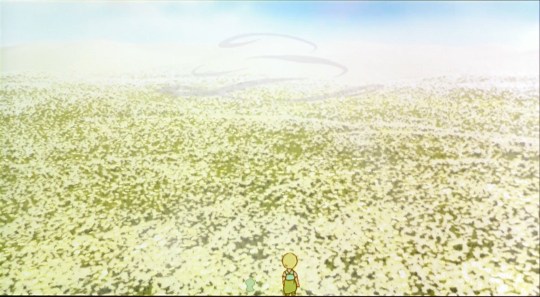
I’m not going to dwell on this too much because I’m going to be going more in detail about it below, but our story starts off in Wallace’s hometown of Summer Memory, a fictional rural village in Colorado, in 1995. (As mentioned earlier, this is a bit of a timeline contradiction; Adventure episode 45 establishes that “the one who wishes for stability” and the Agents didn’t get the idea of human Chosen Children until 1995, whereas the events of Hurricane Touchdown imply he’d been one before then.) Chocomon suddenly vanishes, and a gust of wind is left behind, implying that he must have been kidnapped. It’s not exactly said by what he was taken by (Digimon: The Movie ties it into Our War Game! by having both be traced to a “virus”, but no mention of such is made in the original Japanese version).
The mystery of what it is that took Chocomon away is never fully elaborated in the course of the movie, but as it goes on, it becomes increasingly apparent that it doesn’t actually matter. Why? Well, stay tuned.
So, timeskip to 2002!
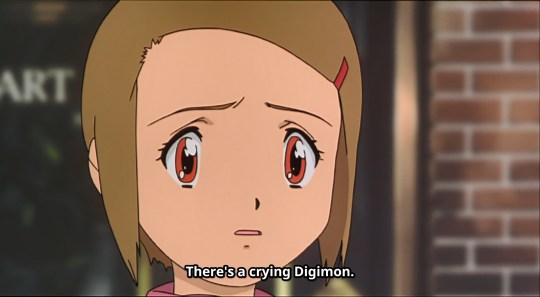
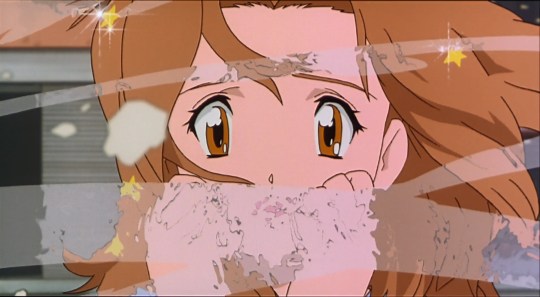

As Takeru and Hikari are visiting Mimi in New York, Hikari, who is known to have a bit of an empathic connection to Digimon, senses that there’s a “crying Digimon” (this will be important later), and Mimi suddenly vanishes – as do the other Chosen Children.
I think part of the reason this movie is often pinned as feeling like an acid trip is that the demeanor and attitude the 02 kids express in this movie feels a little too laid-back for the very urgent situation of their seniors having suddenly up and vanished (which is also not helped by the movie’s overall soundtrack being a lot more laid-back than the events on screen should suggest). This is especially odd because it’s absolutely not like the kids aren’t worried about their seniors at all! Rather to the contrary; “getting Taichi and the others back” is the major motive driving the whole group for the rest of it, and it’s constantly brought up as their goal in dialogue, shaping their actions throughout the rest of the movie. The execution of the dialogue and the overall direction create a bit of a tonal mismatch, but on its face, the actual storytelling checks.
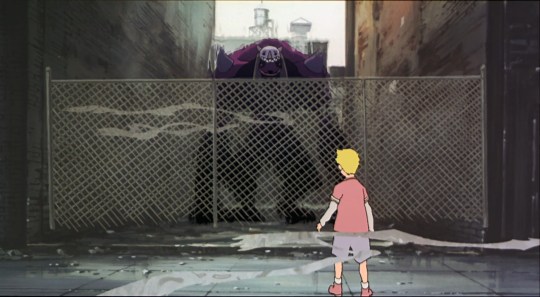
Shortly after, Chocomon – now evolved and corrupted into something – appears, and Wallace and Gumimon confront him.
The fact that Wallace refers to his partners by their Baby-level names (Chocomon and Gumimon) even after they’ve clearly evolved brings up a lot of interesting implications. One is that, not having been privy to any great adventure in the Digital World before, Wallace doesn’t have a lot of awareness of names changing after evolution the same way his Japanese peers do. But another important thing that comes out here is that, through the course of this movie, Wallace primarily sees his partners the same way he did as a young child. A lot of this movie’s story centers around Wallace’s difficulty in moving on from the past and accepting that things aren’t the same way that they are anymore – and so, just like how he has a hard time swallowing that the circumstances have changed, he has difficulty seeing his own partners as having changed, and calls them by the same names despite everything.
Takeru and Hikari catch on, and Hikari’s psychic sense catches on that something’s happened to her brother, too.
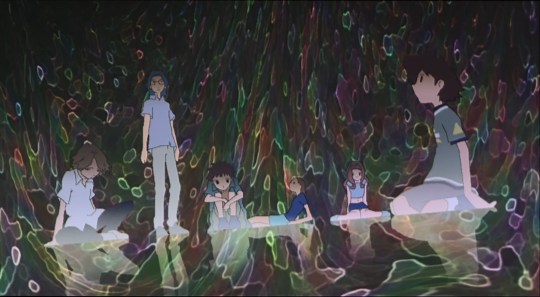
Oh, and incidentally, said seniors aren’t in a pleasant place to be in at all.
The fact that the older kids are clearly Not Having a Good Time in the realm they’ve been kidnapped to – it’s depicted as cold, lonely, full of negative emotions, and eating away at their ability to even bodily function – is very heavily connected to what we later learn about what’s been going on with Chocomon through the last seven years. Moreover, the one truly coherent thing Taichi and Yamato can spit out at this stage is concern for their siblings – i.e., love. Keep that in mind for later!
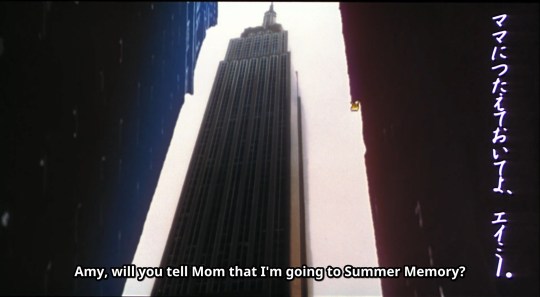
Wallace drops a line to his family (”Amy” presumably being his sister) saying that he’s going to head to Summer Memory, and skips town. Repeat: Summer Memory is in Colorado – he’s doing something as drastic as going out of state to follow Chocomon, which naturally does not amuse his mom very much (as we find out later in the movie). Patamon eavesdrops on the conversation and relays the information to Takeru and Hikari, who contact Daisuke in turn.
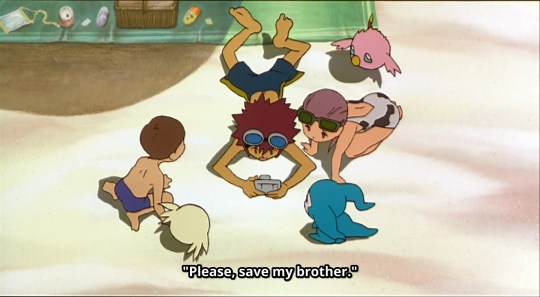
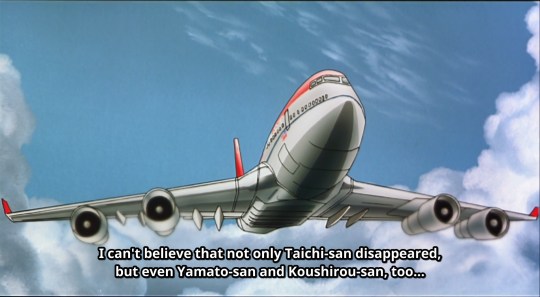
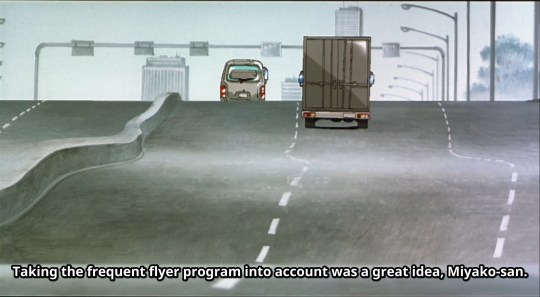
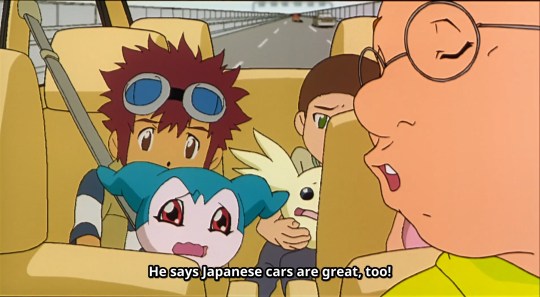
So the remaining three kids nyoom all the way to the US using frequent flyer miles (which makes you really wonder whose those are, or what on earth they told their parents to allow three elementary school kids go around unassisted in another country) to go save their seniors, which apparently doesn’t fund their trip all the way to Colorado, forcing them to hitchhike from New York.
(We also get a quick scene implying that Daisuke has better proficiency in English than Iori and Miyako, as he translates some of the statements for the guy they take a ride from. This is pretty surprising, given that Daisuke hasn’t really been portrayed as particularly book smart…but then again, language skills sometimes just happen to come naturally to some people regardless of skill in books, and hey, it might just come in useful for his future ramen chef career in New York…)
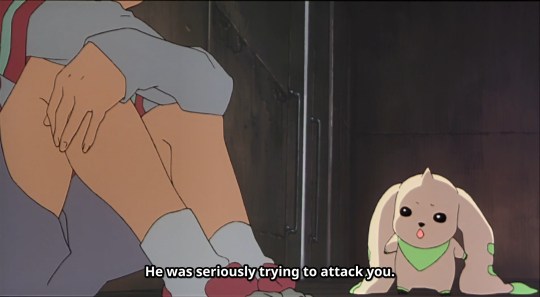
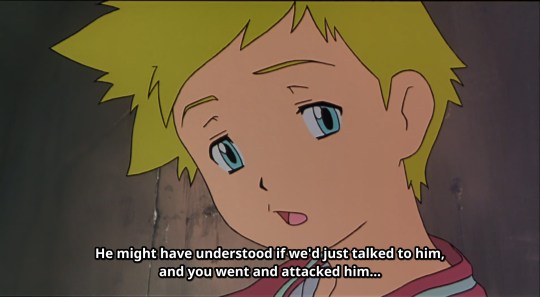
We get our first major scene of dialogue between Gumimon and Wallace, and we learn quite a bit about their characters in the process. Gumimon has a similar laid-back attitude to the more prominent Terriermon in Tamers, but beyond that (and a shared voice actress), it’s important to note that they have very different personalities otherwise. In this scene, Wallace and Gumimon get in an argument over how to handle Chocomon, with Wallace insisting that they shouldn’t have attacked him and that they should have just “talked” about it – even though, as Gumimon correctly points out, he was pretty obviously trying to physically attack Wallace.
In fact, at this part of the story, Wallace is being extremely irrational and in denial. You don’t even have to watch the rest of the movie to see that Gumimon’s very practical stance on the matter is reasonable – Chocomon was very much trying to attack Wallace, and getting caught in the fight was pretty much all he could do for Wallace’s safety. But Wallace, still stuck in the past, can’t accept that at this point in the movie, and, honestly, is being a bit of a brat about it too – he’s engaging in progressively more self-destructive behavior over the course of the movie (ditching his family to set off by himself in order to hitchhike to Colorado, for one). We later find out that Wallace is specifically obsessed with going back to the flower field where he lost Chocomon, having independently come up with the idea that this would somehow let everything go back to what it was before – even though there was really no sign this would actually fix anything.
The Adventure universe generally runs on a concept that a Digimon partner is representative of part of the self, and so, tying that into Wallace and his two partners, it can be taken that Gumimon and Chocomon reflect the duality of Wallace as a character – Chocomon representing his desire to latch onto the past and hope that everything can be the same that it was before, and Gumimon as Wallace’s sense of reason, advising him about the reality of the situation and how to practically get through it (and, thus, to move on). In fact, Gumimon is the one constantly advising him about said self-destructive behavior (reminding him that his mom is probably worried about him, but also berating him for just ditching the train as a result instead of thinking about how that’d leave them without reliable transportation for the rest of it).
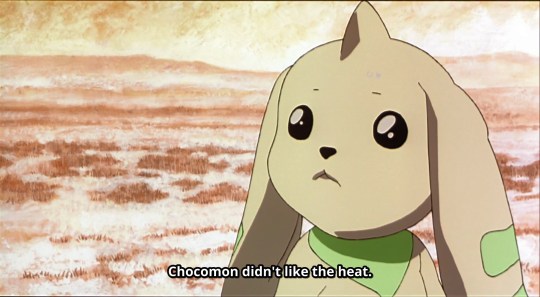
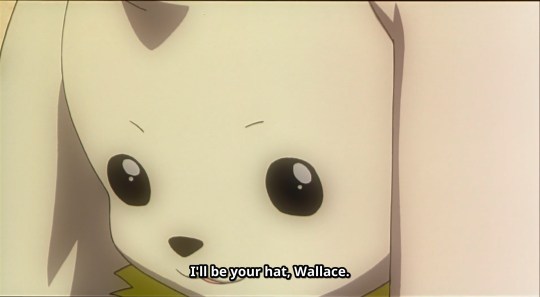
The symbolism is driven in even further when the only thing Gumimon has to say, in response to Wallace clinging further onto the idea that going to the flower field will fix things…is a cryptic statement that Chocomon didn’t like the heat, then suddenly offering to be a hat to provide Wallace shade. Because right now, Wallace and Chocomon are the same: clinging hopelessly to shards of the past.
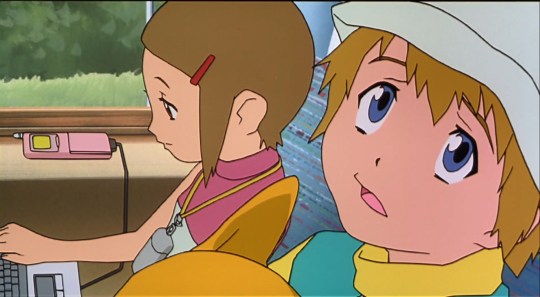
The other 02 kids make their way to meet up in Colorado, but run into some snags when Daisuke, Miyako, and Iori end up missing the exit to Denver (Takeru is not amused), and Hikari and Takeru’s train ends up stranded thanks to Chocomon’s interference…
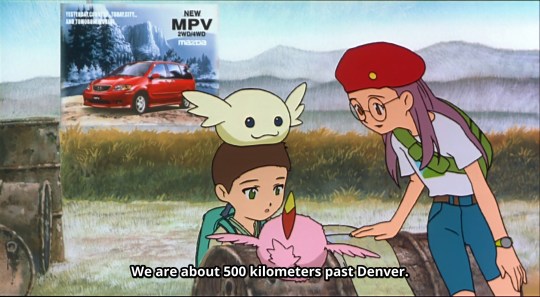
…and, making things worse, Daisuke, Miyako, and Iori try to take a plane back to Denver, only to overshoot it again. (Sorry, Taichi…your juniors are idiots.)
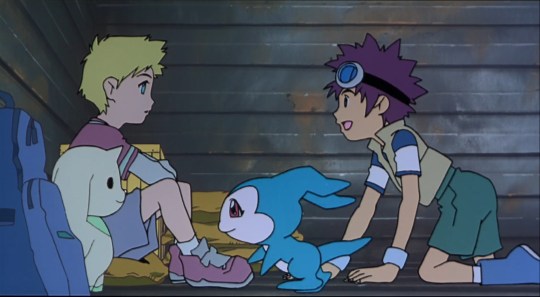
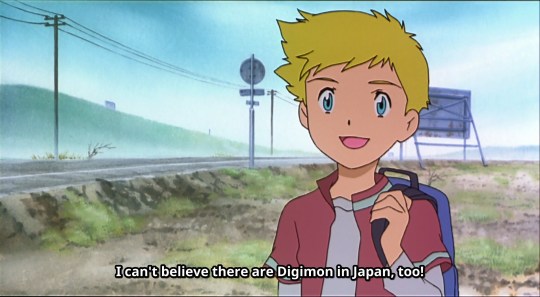
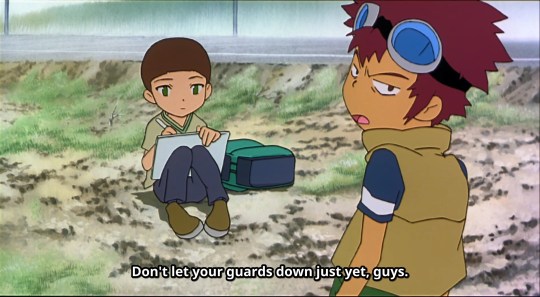
Fortunately, they get lucky by running into the very same boy they’re indirectly looking for on their way to hitchhiking. We learn that Wallace has never had exposure to other Chosen Children before to the extent of knowing there were any Digimon in Japan, nor has he ever been to the Digital World, so for all intents and purposes, his experiences with Chocomon and Gumimon are all he knows (i.e. he has no awareness of large-scale Digital World affairs). He also apparently speaks Japanese, which is convenient for this movie so that they don’t have to have a language barrier, but, amusingly, Wallace claims that it’s because he “had a Japanese girlfriend once”. (Gumimon, who is much more reliable of a source, says that he’d apparently put an honest effort into studying, so an interpretation that Wallace really likes anime or something is not out of the question.)
It’s also interesting to see how the others react to him, especially considering that it’s becoming increasingly apparent that he’s involved with the disappearance of their seniors. Miyako is as openly friendly as she generally always is, Iori presses him very calmly about questions relevant to the disappearances and Chocomon without even batting an eyelid (future lawyer in training here), and Daisuke is suspicious from the get-go…which is exacerbated when Wallace starts flirting with Miyako. The running gag of Daisuke getting angry about Wallace flirting with Miyako has a lot to unpack here – the most obvious standby is the shipping interpretation (or, at least, that Daisuke may be as protective of Miyako as he is Hikari), but there are other points to observe as well. Firstly, Daisuke is a rather abruptly straightforward and overly honest person, and it makes sense that he’d play badly with people who seem dishonest – after all, his suspicions of Wallace started even before he started flirting, and he also shows similar hostility around Takeru (also not a very straightforward person) when he suspects he’s being made fun of. But also, the Pixiv dictionary entry takes the interpretation that Wallace’s personality had gotten a bit “warped” by his experiences – or, in other words, he’d developed this penchant for acting like a flirt, wandering off on his own, and altogether being incredibly wishy-washy because of the trauma of losing Chocomon and his inability to get over it.
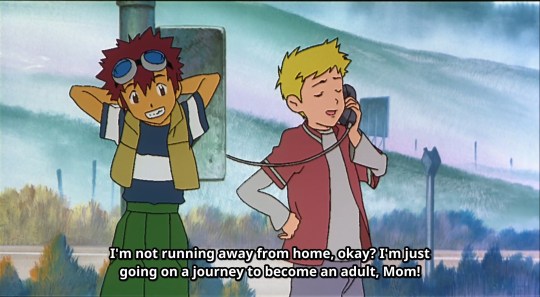
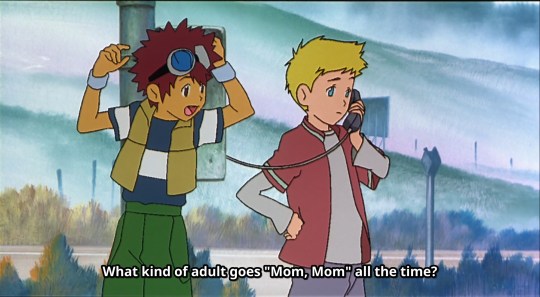
And as much as Daisuke’s being a prick about it (to the point that mocking Wallace for it gets him left there stranded with him), he’s absolutely right about the contradiction Wallace’s posing – he’s acting all high and mighty about trying to become an “adult” (meaning that going off on his own and flirting with girls presumably are part of his perception of what Mature Guys do), yet he’s being a total mama’s boy by constantly dropping everything to call her repeatedly through his trip. (It’s even worse than the subs here suggest; he calls her “mama”, the kind of super-affectionate language used by Mimi and Ken.) As Gumimon says, Wallace thinks he’s actually right, but he doesn’t actually have it together at all.
Another interesting thing to note here is that at this point of the movie, Wallace calls Daisuke “Daisuke-kun” (with honorific attached, slight distance). Remember this for later.
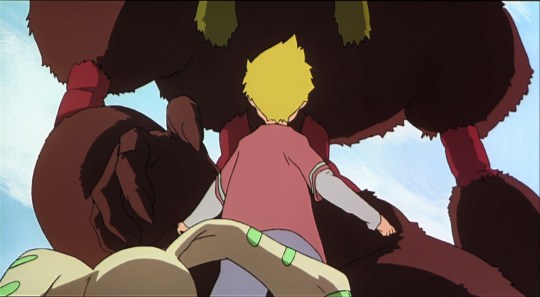
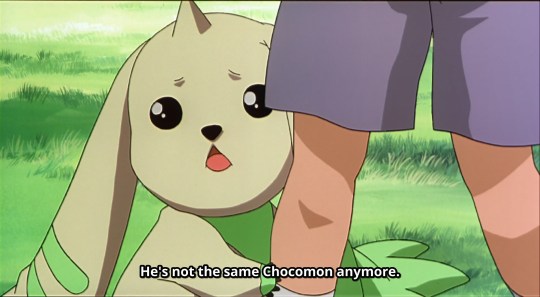
Chocomon appears to confront them again, but he seems to not properly recognize Wallace – because, as we later find out, he doesn’t see the current Wallace as “Wallace”, and will accept nothing less than a younger Wallace from exactly the way he was when they were separated. (It is later stated in the movie that this is why he kidnapped the seniors and turned them younger; since he can’t recognize “Wallace” the way he is now, he’s taking anyone he can find with a Digivice and de-aging them in the hopes that he’ll find “Wallace” among them.) Gumimon recognizes that Chocomon is beyond recognition, and tells Wallace to not see him as Chocomon, but Wallace refuses to accept this and continues to intervene in the fight, telling Chocomon that they’ll meet again in the flower field. Again, Wallace’s mentality isn’t that different from Chocomon’s at this point – he may not be delusional to the point he wants to literally turn back time, but he still thinks that reproducing the conditions of seven years prior will fix everything and make it all better again.
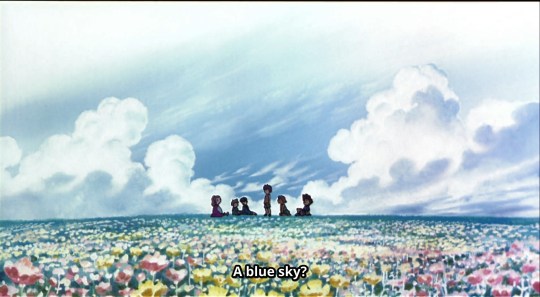
During this whole time, the older(?) kids are getting progressively younger, and it’s turning out to impact not only their physical bodies but also their mentalities. At this point, they’re starting to lose awareness of what’s happening to them, as they become more and more connected to Chocomon’s emotions.
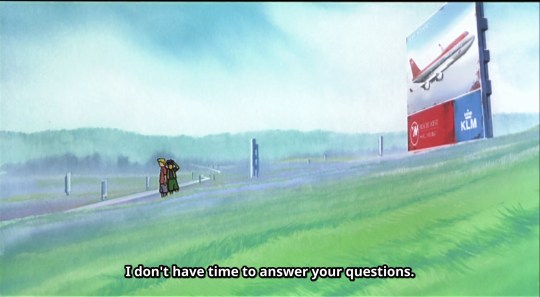
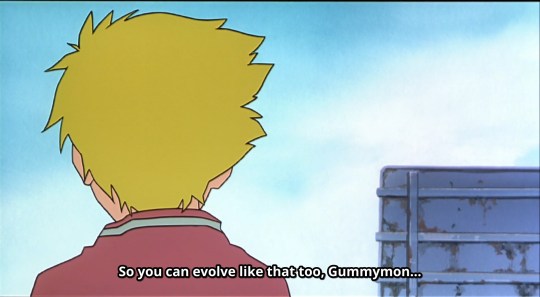
Daisuke is smart enough to catch on that Wallace definitely knows what’s going on, and starts to interrogate him. Recall that Daisuke is completely within his rights to do so at this point – Wallace is not only acting incredibly shady, he’s also being dismissive and refusing to give Daisuke any concrete answers about something that most certainly involves him at this point. As the 02 kids keep reiterating, their seniors have been kidnapped, and it’s pretty clear to anyone that Wallace knows something about this, but he continues to blow them off.
Wallace also doesn’t seem to be very happy about the fact Gumimon had evolved during the battle – remember, Wallace is very resistant to changes in his status quo, and especially when it involves Gumimon evolving in a similar way to Chocomon.
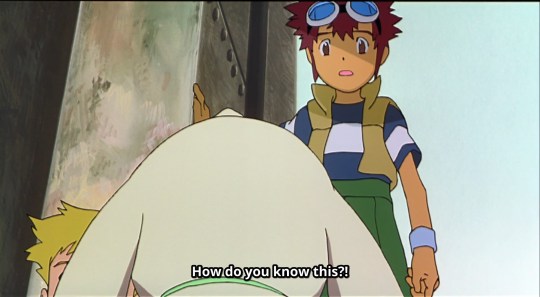
Daisuke continues to pry into what’s going on with Wallace and Chocomon, and Gumimon, who understands that there’s no use in denying that this is a problem, tries to be straightforward about it – but Wallace, still stubbornly refusing to open up about it, won’t even let Gumimon tell Daisuke about the truth.
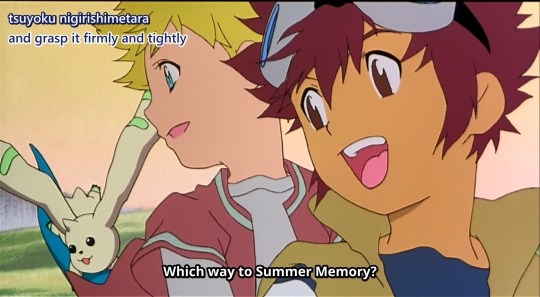
Daisuke realizes that they’re not going to make any territory as it is, so he decides to have Lighdramon take them to Summer Memory for the time being, bonding a bit more with Wallace in the process.
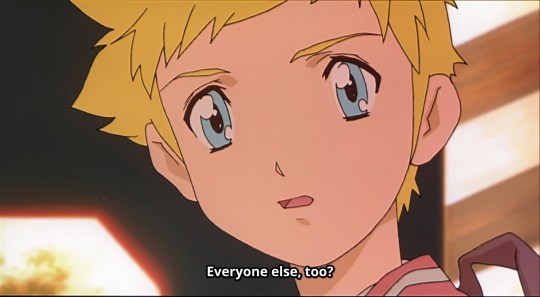
Once they reach Summer Memory, the kids learn about Takeru and Hikari getting stalled by Chocomon on the train, and the fact everyone else on it had disappeared – meaning that the responsibility that Wallace is carrying for not taking care of this problem begins to weigh further on him. Daisuke, Miyako, and Iori continue to interrogate him about what he knows.
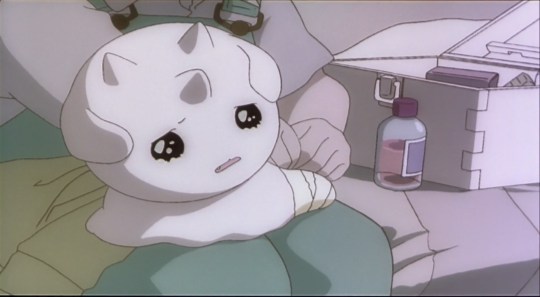
But Wallace, still stubbornly, refuses to talk, and being in Summer Memory only drowns him in further memories of his past with Chocomon and Gumimon. We learn a bit more about Gumimon’s past, too – apparently, he was quite the crybaby…
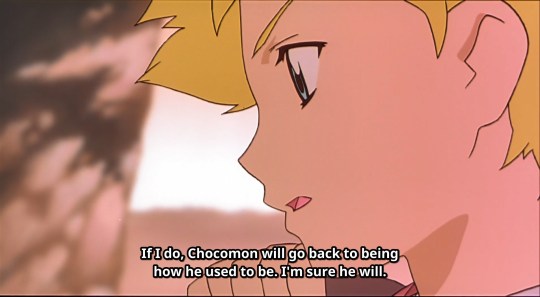
And when Gumimon finally begins to spill the details of what’s going on – that Chocomon wants to see the younger Wallace and is kidnapping kids with his Digivice and turning them younger as a result – Wallace still continues to double down on his denial. Notice his wording – his specific insistence that things will go back to “how they used to be,” because it’s not just about getting Chocomon back, but also a fixation on recreating that happy childhood he had with him.
(There’s also a bit of a cute moment around here where Daisuke asks Wallace if he needs to call his mom – after having teased him for being a mama’s boy earlier, Daisuke really is starting to care about his welfare. It’s also amusingly mentioned that Daisuke, Miyako, and Iori are broke out of money until they meet up with Takeru and Hikari again…)
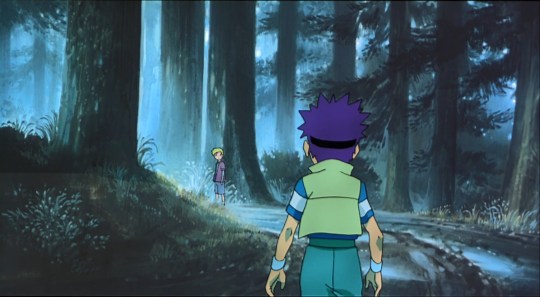
That night, Wallace tries to go off by himself to the flower field, not even bringing Gumimon with him – as he implies later, he doesn’t even want to get Gumimon involved with this because he was the closest to Chocomon – but Daisuke, having finally caught on to his suspicion that Chocomon is not only relevant to Wallace but also Wallace’s partner, confronts him about it. Wallace thus finally spills the details – that Gumimon and Chocomon were born from the same egg, that Wallace kept them from his mother and stuck with them during childhood, and that, seven years prior, Chocomon suddenly vanished while they were playing at the flower field.
Wallace: I’ve never been able to forget about Chocomon since then. Not even after moving to New York, not even once. We were such good friends…So why did Chocomon have to end up like that? Does he hate me for not being able to save him? Daisuke: So the enemy we’re fighting is actually your Digimon? Your most important friend?! Daisuke: Of course you’d never be okay with that…
Daisuke is in shock, even though he’d already started to suspect this.
I said, earlier, that Wallace is being extremely irrational and in denial. I did not say that his feelings aren’t valid. Wallace’s situation sucks, and Daisuke recognizes why this hurts for him so much, especially after putting himself in Wallace’s shoes (and in fact it’s even worse for Wallace; Daisuke’s only known V-mon for less than half a year, whereas Wallace is talking about his formative childhood friend).
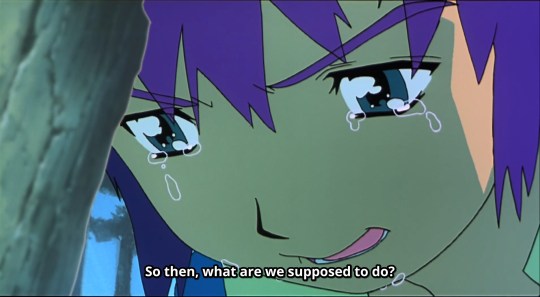
Daisuke: I’d never be able to do it. If V-mon were to turn into something completely different…Even if he went on a horrible rampage…There’s no way I’d ever be able to bring V-mon down. Wallace: Daisuke… Daisuke: So then, what are we supposed to do? Wallace: It’s not something you need to be crying over. Daisuke: But…
This entire scene is an interesting one for many reasons, especially because of the position in which it aired – this was in the middle of the arc in 02 when everyone was getting their second Digimentals. Daisuke had, only a few episodes prior, expressed trepidation over “friendly fire” – fighting any friend who had become controlled by the Digimon Kaiser. This is consistent with that (and the 02 kids’ general bleeding hearts and difficulty with fighting friends), and it’s even worse – unlike before, when we were talking about evil mind control, Chocomon is pretty obviously a victim of his own madness. And although Wallace continues to insist that this isn’t Daisuke’s problem, Daisuke, for all he’s rough around the edges, is a genuinely kind person who thinks of others to the point he breaks down in genuine tears over the problem, and it’s consistent with not only his prior characterization of thinking about others’ feelings in 02 episode 8, but also how this eventually ties into his indignation over seeing others being hurt (episode 20) or their feelings being trampled on (episode 49).
Another interesting thing here is that at no point in the movie is “killing” ever brought up, but rather the word used is taosu, which literally means “defeat”. In 02 proper, its use is somewhat euphemistic – most famously, it was used in episode 44, when Miyako and Hawkmon have a crisis over killing LadyDevimon (so in short, there’s no illusions about the fact killing is in play here). But in this context, it’s not even really about killing. Wallace doesn’t even want to fight in the first place. The sheer action of physically beating up a beloved friend is painful, with killing as the ultimate unwanted outcome. Everything about this sucks. But Daisuke correctly points out that Taichi and the others’ welfare is on the line here, and everything feels like the wrong thing to do. “What are we supposed to do?”, indeed.
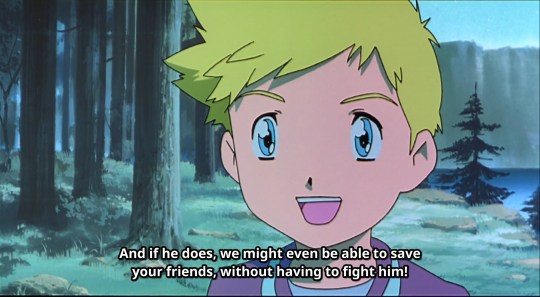
So that’s why Daisuke momentarily indulges in Wallace’s denial-induced pattern of thought, because it really does seem like the only out here. (Especially because, from Daisuke’s perspective, Wallace seems to understands this situation better than he does – even if he doesn’t actually.) If they go to the flower field, they won’t have to fight and everyone will be saved and it’ll be fine! Wallace is irrational and in denial, but you can’t blame him and Daisuke for really, really wanting to believe this.
And Daisuke drops this zinger of a line, too:
Daisuke: So don’t say you’re gonna go alone.
Daisuke’s characterization really is important here, because, again, this movie came out during the first arc of the series, before episode 21 and the second half that centered around Ichijouji Ken’s redemption. At this point in the series, Daisuke was still being extremely deferential to others, especially his seniors, in almost all cases, and although episode 8 was a momentary glimpse into the kind of resolve Daisuke could have when it involved something he really cared about, this movie is really the first major sneak peek into how supportive of a person Daisuke is going to develop into, especially when it comes to Ken.
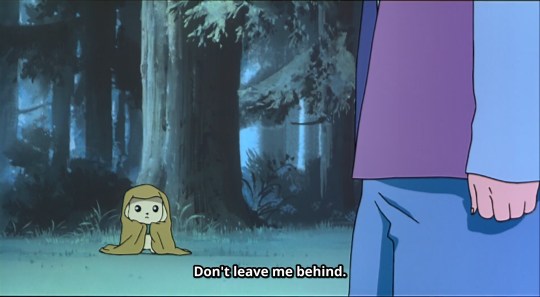
And Gumimon reaffirms that he’s going to stick by Wallace no matter what – filling the traditional role of a partner that Chocomon won’t anymore.
So they go to the flower field, and everything…fails spectacularly.
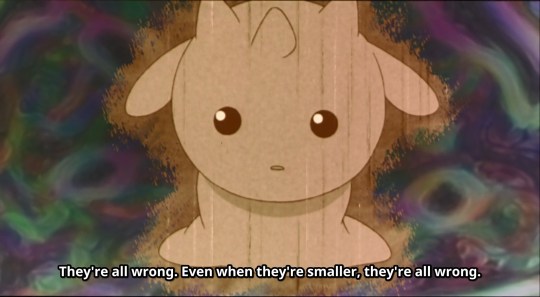
Well, before that, we get a glimpse of how the older kids are doing (they’re barely even conscious now), and we finally get to see Chocomon “in his element” and not as a rampaging monster. Things really, really aren’t going great for Chocomon either. He desperately and sadly jumps among the kids, trying to find Wallace among them, and what he really, really wants is just to be with his partner again. But they’re all “wrong”…
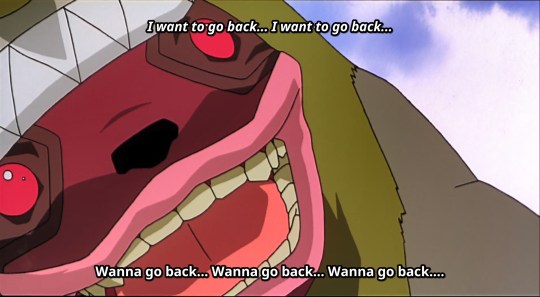
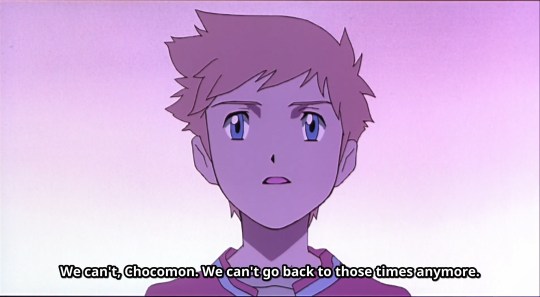
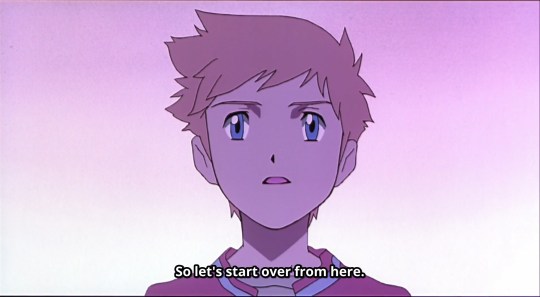
At first it seems like Wallace is making headway – for a second, Chocomon even recognizes him as Wallace! – but he continues to insist that he wants Wallace to come “with him”, to where it’s “cold and lonely and no one is there”. The way he starts chanting that he wants to go back is represented by the young Chocomon’s voice getting progressively lost in the monster’s voice, and Wallace, starting to grasp how futile Chocomon’s clinging to the past is, makes his first statement of the movie’s core theme: you can’t go back to the past, the only thing you can do is look forward and think about what you can do from there.
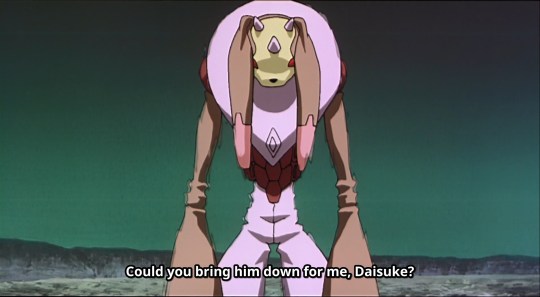
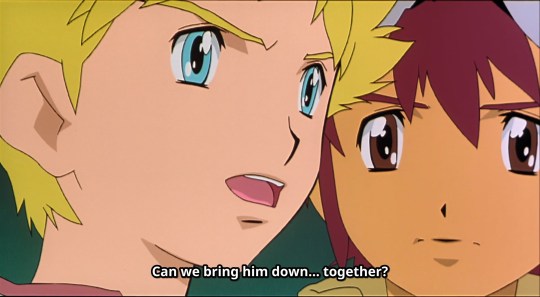
So after witnessing very clearly, in front of his eyes, how Chocomon is not going to listen to reason and will accept nothing less than something he can’t have, to the point of evolving and distorting everything around him, Wallace’s denial finally hits its limits, and he accepts that fighting him will be the only option out. (Again, note the use of “defeat” here – it’s not really about beelining straight to euthanizing him as much as Wallace has finally gotten over his refusal to fight Chocomon at all.) And considering that the situation is clearly rapidly escalating, and that Chocomon himself is clearly not in sound mind and having a terrible time himself, it doesn’t take much to see why the bleeding-heart Daisuke would also end up conceding so quickly. There’s a limit to how much you can hold out with pacifism when that just happened right in front of you!
(Also, Wallace no longer uses the honorific on Daisuke. Friendship level up!)
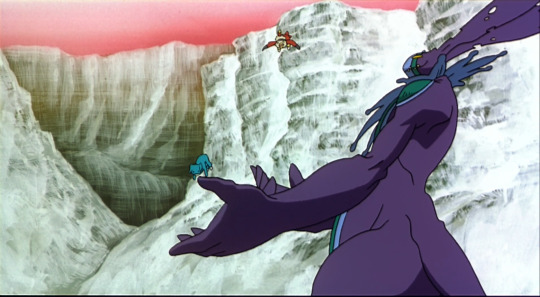
Chocomon evolves further and further, and his personality starts to actually take a turn for the cruel as he starts toying with the Digimon. In fact, it’s made pretty apparent that they’re no match for him from the get-go – he keeps toying with reality and forcing the Digimon back and forth between forms. He ends up “altering the world” into something reflective of his own heart, and it’s repeatedly pointed out that it’s “cold and lonely” – in short, Chocomon is subjecting the world to feel the same pain and loneliness that he felt, the pain that was enough to drive him mad.
And Wallace finally has this to say:
Wallace: Like Daisuke said, I’m a big baby. But you’re not Chocomon anymore. No, you’re the one who did this to Chocomon…Chocomon was all by himself and lonely, and in that loneliness, he tried so hard…But you took his heart and locked it away somewhere! I’m going to fight. If I defeat you…If that means I can free Chocomon from you…Then I want to fight, too! I need strength…
Firstly, Wallace acknowledges that he’s been a brat – that he’s been philandering around and acting spoiled and stringing everyone around (character development!!). And secondly, Wallace finally acknowledges the truth of Chocomon no longer being recognizable anymore. The ending quarter of this movie focuses heavily on the idea that Chocomon has now become so distorted that he can no longer even be considered the same thing anymore – it’s ambiguous as to whether that “you” that Wallace refers to having taken Chocomon away is actually a separate supernatural entity, or whether Chocomon was drowning in his own loneliness to the point those negative feelings became their own entity and consumed him.
In actuality, though – it doesn’t really matter! 02 as a series would also go on to blur the boundaries between external interference and internal forces – Ken having the Dark Seed as an influence but also being personally responsible for his own emotions driving him over the edge, and having to take responsibility regardless, and Oikawa technically being possessed by Vamdemon but still being goaded on by his own fixation with the past (in fact, notice how all three of these cases have to do with a fixation on things that can’t be brought back). Right now, the only thing that matters is that Chocomon is no longer recognizable, the thing in front of Wallace is no longer the same friend he knew, and even being able to bring back Chocomon’s sense of self is something Wallace wants.
(Daisuke also throws in a more charitable interpretation of Wallace’s actions even when he’s being hard on himself, pointing out that he can’t really be called a “baby” when he also did have genuine determination to come all the way there to find Chocomon despite his age.)
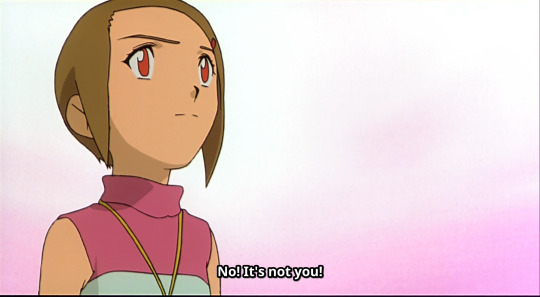
Hikari and Takeru arrive on the scene, and after Daisuke loses his marbles a bit over his happiness at seeing Hikari-chan there, Hikari points out the same thing: “You’re not the Digimon that was crying.”
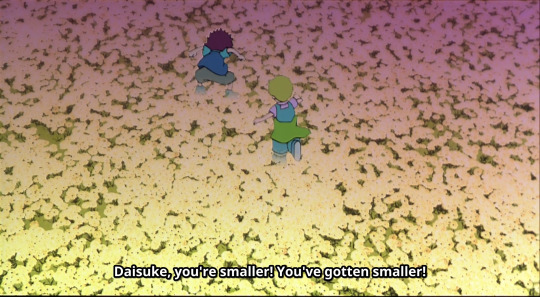
Chocomon starts turning the 02 kids younger too – and remember, it was established earlier that he was using the Digivice as a guide. That meant it made sense for him to target the older kids, since they had the same model of Digivice Wallace did. But Daisuke and the others have D-3s, and there’s no way to really mistake them for Wallace – so in other words, Chocomon has devolved to inflicting cruelty for no good reason, with the original motive having completely vanished.
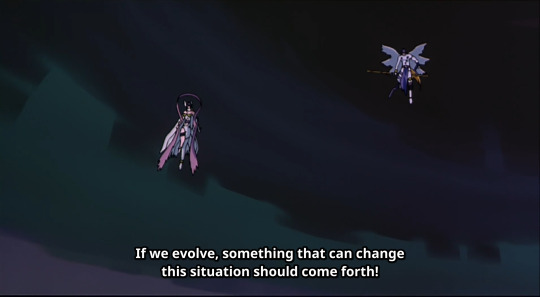
In increasing desperation, Angewomon and Angemon decide to evolve, and…look, I don’t have an explanation either, but I have to admit I’m somewhat amused by the fact that even they don’t really seem to have an explanation beyond “well, we’re desperate and hopefully it’ll do something!”
So they evolve, and Chocomon oneshots them. But that’s okay, because they released some golden Digimentals for Daisuke and Wallace to use! So V-mon and Gumimon get shiny new golden forms –
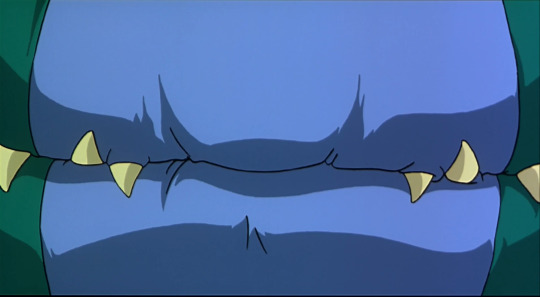

– and Chocomon pretty much oneshots them, too. More specifically, he eats them…and within his body, Magnamon and Gumimon’s consciousness gets eaten apart to the point they start forgetting their partners. Wow, this situation just got worse.
Yeah, so, despite the movie being named after the golden Digimentals, the actual point being here is that power means absolutely nothing in this situation. Remember, I pointed out that even from the beginning Chocomon was straight-out warping reality – they really didn’t have a chance.
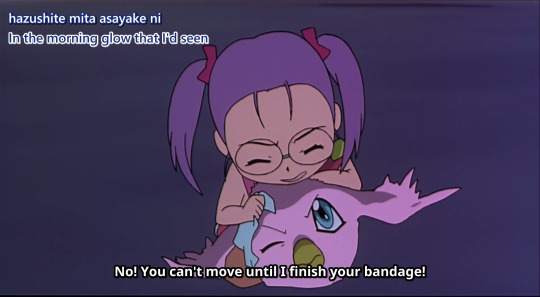
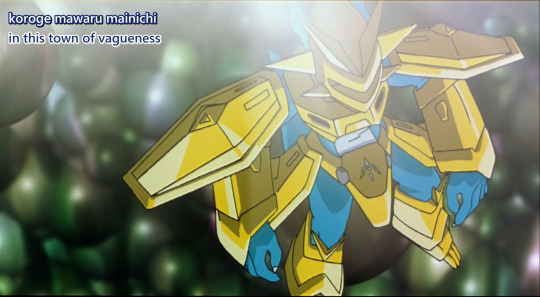
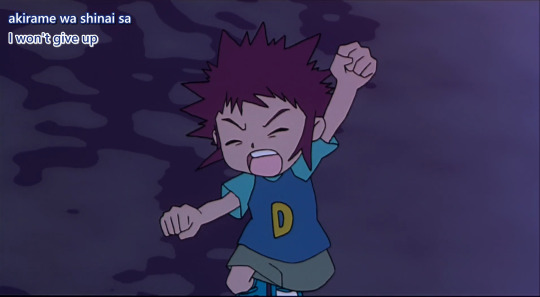
So basically, everything devolves into complete chaos. Everyone’s being turned into little kids, with the mentality to match. All the Digimon are being oneshotted and being tossed around like tissues. But the one constant through all of this is that the kids are constantly running after their partners.
Remember how, back when the older kids were first getting sucked into Chocomon’s world, the one thing that seemed to remain intact at first was “love”? That “love” is what reaches out to Magnamon and Gumimon inside Chocomon, and makes them remember their partners again.
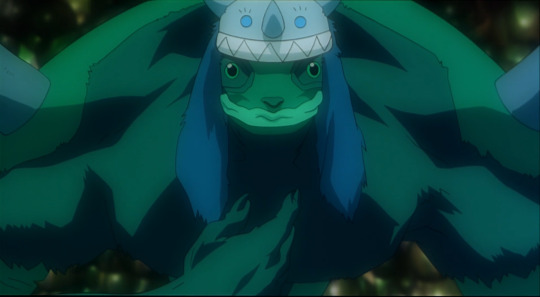
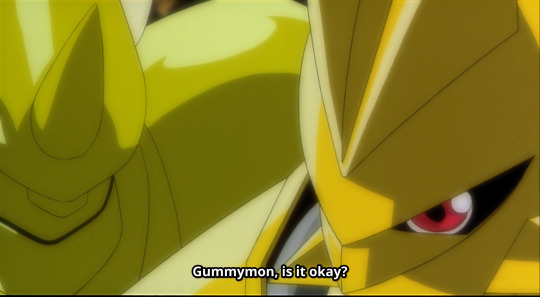
And, more importantly, that “love” is what awakens Chocomon – the real Chocomon – inside his consciousness, and he wordlessly makes a gesture begging Magnamon and Gumimon to kill him. And so they do – with understanding and consent from all three involved.
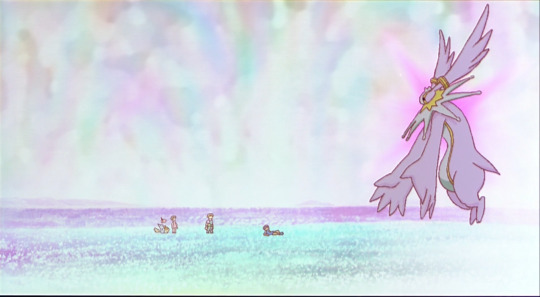
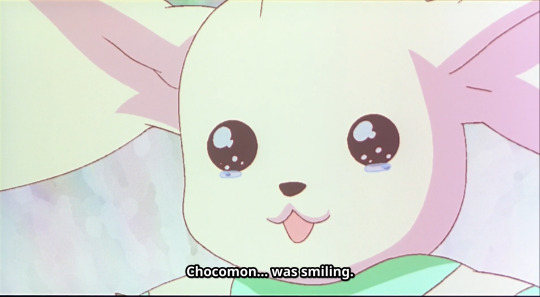
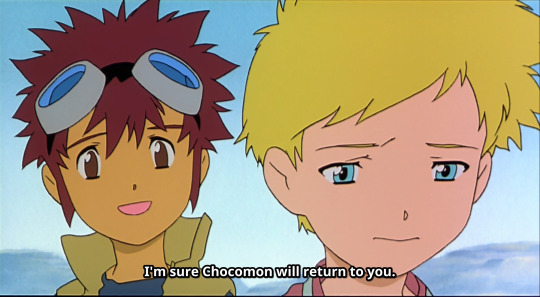
So in the end, the most extreme conclusion was reached. Chocomon died, at the hands of Daisuke and Wallace’s partners. But in that moment before he died, Chocomon’s pain was relieved, and he was himself again – Gumimon says that “Chocomon was smiling”, even in spite of his usual personality being that of a crybaby. They may have failed in their struggle to prevent the inevitable conclusion of having to kill Chocomon, but they did, to some degree, “save” him – so all of it did mean something in the end. And Daisuke promises that this still doesn’t mean the end of everything – they may have not been able to bring back Chocomon, and especially not in the exact way that would make things “the way they were before”, but the future is still there for him to return someday.

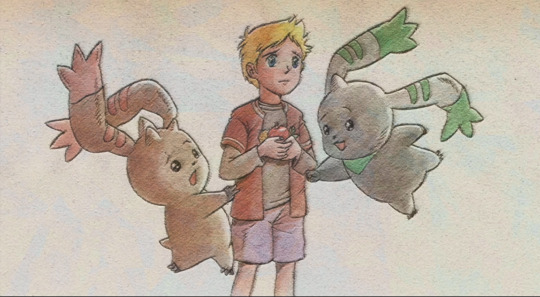
So, we clean up loose ends. Taichi and the others are returned safely, and in the end, Wallace decides to still be a vagrant for a bit longer – and to flirt with Hikari and Miyako a bit before he leaves. In the end, Wallace still has a long way to go if he wants to really grow as a person. But as Miyako points out, he’s gotten a bit bolder than he was before – and he’s greeted with an egg in the end, as if opening up new possibilities.
The Door to Summer contradicts the finding of this egg, or at least opens up the possibility that this wasn’t actually Chocomon’s, so it’s ambiguous as to whether the frame of Terriermon and Lopmon at the end of the credits is meant to be taken literally, or if it’s just symbolic. But even in the case of the latter, Chocomon is seen as Lopmon, a form he never got to have in Wallace’s childhood – so, in the end, it’s about different possibilities opening up in the future, rather than replicating that of the past.
All right, let’s recap this movie for those doing a tl;dr! Or, more specifically, let’s recap the events in chronological order:
Sometime before 1995, an egg emerges from Wallace’s mother’s computer, and hatches into twin Digimon, Chocomon and Gumimon.
In 1995, while playing in a flower field in Summer Memory with Wallace and Gumimon, Chocomon disappears for unknown reasons.
For the next seven years, Chocomon is trapped in delirium, full of loneliness and pain from being unable to see Wallace, and starts to become obsessed with the idea of reuniting with him, but, in his madness, accepts only a version of that reunion that involves him being the same young child he was when they parted, as if nothing had changed since.
Wallace, likewise, develops a fixation with getting Chocomon back so that things can be like “the way they were before”, even after moving to New York.
In 2002, Chocomon begins to kidnap kids with the same model of Digivice that Wallace has, and starts to forcibly turn them younger and send them into delirium like his own, hoping that this will bring the “Wallace” he wants back. Wallace starts to chase after him and decides that returning to the flower field in Summer Memory will allow him to communicate with Chocomon and make him go back to the way he was before.
Takeru and Hikari, hoping to find a lead on their seniors’ disappearance, drop a line to Daisuke, Miyako, and Iori, who head to the United States, also hoping to find a lead in Summer Memory. On the way, they run into Wallace, who is evasive about his connection to Chocomon and the kidnapping incidents.
At Summer Memory, Daisuke confronts Wallace and learns about his story, emphasizing deeply with the difficulty in killing an important friend, and agreeing that they should reach out to Chocomon at the flower field.
Chocomon continues to fall deeper into madness at the flower field, and Wallace and the others realize that they have no choice but to fight him. As Chocomon becomes so distorted he’s no longer recognizable, Wallace declares an intent to at least save his consciousness.
As the fight carries on, the kids are de-aged by Chocomon in his madness, and Magnamon (V-mon) and Gumimon are swallowed by Chocomon. However, the kids’ love for their partners awakens Chocomon’s consciousness again, and he asks Magnamon and Gumimon to end his pain.
With everything settled, Wallace and Gumimon are able to face forward into the future in the hopes of meeting Chocomon again and starting anew from scratch.
The Door to Summer
Actually, there’s not much to really be said about Hurricane Touchdown’s spiritual sequel The Door to Summer, except that it revisits similar territory to the movie, observing it more in Daisuke’s context than it does Wallace’s. (The story is very much more Daisuke’s than it is Wallace or Mimi’s.) The short synopsis is that Daisuke, having had a pretty bad time recently, finds himself in contact with a mysterious “winter” (in the middle of summer!) that seems to reflect his own heart…and a mysterious amnesiac girl whom Mimi names Onpu “Nat-chan”, who immediately latches onto Daisuke. In the end, “Nat-chan” turns out to be “a Digimon who’s taken in a lot of evil data,” who goes on a rampage and forces the others to fight and eventually kill her.
Although the reason for Nat-chan going on a rampage is more concrete than what was given in Hurricane Touchdown (it’s portrayed as “data chips” that seem like fireflies), The Door to Summer also makes it very clear that it wasn’t just supernatural influence, but also Nat-chan’s loneliness, desire for a human partner, and jealousy of Daisuke and V-mon’s relationship. Daisuke, while showing immense hesitation about fighting her when she had befriended them, still manages to “save” her in some way, to the point she actually verbally thanks him as she dies. And in the end, Daisuke and the others decide to take her egg and find a partner for her – even if she can’t be Daisuke’s partner like she wanted, she can still start anew with someone else.
Wallace in Kizuna
Warning: The rest of this post contains spoilers for Kizuna.
As said before, Hurricane Touchdown has been said to be the favorite Digimon movie of the director of Kizuna – and certainly, while Kizuna references all four Adventure-series theatrical movies, Hurricane Touchdown’s references are the least subtle, with the plot point of de-aging kids lifted directly from it. (Except, in this case, it’s in the context of trapping oneself in blissful memories rather than being portrayed as the upfront listless torture it is in Hurricane Touchdown.) Moreover, the theme of warning against being fixated on the past is just as present in Kizuna as it was in Hurricane Touchdown, especially when Kizuna’s main antagonist (Menoa) also falls victim to something that’s part supernatural influence and part getting swallowed by her own negative feelings…so it’s only fitting that Wallace himself makes a cameo in the movie. Two cameos, in fact.


The fact that Wallace is established as canonically existing within the Adventure main timeline has thrown a lot of people for a loop, especially since recent franchise events have made it questionable as to how it’s possible for canon to even make sense anymore because consistency has just gone out the window, but the Pixiv dictionary’s chosen rationalization for this is that, at the very least, “(some version of) Wallace exists in the timeline of the main story”. I’m inclined to agree with this evaluation; the fact that people around the globe can agree that the movie is questionably canonical but can’t even agree on how, and the fact that certain franchise entries considered canon (Tag Tamers) have their own contradictions, plus the fact that it’s not like Hurricane Touchdown takes a complete knife to timeline and lore common sense and more that it has some contradictory minutiae that are really easy to sidestep, it’s not actually that hard to say that some timeline of events that reasonably resembled Hurricane Touchdown (with maybe only some minor timeline or evolution differences) happened during the summer of 2002, and thus that Wallace exists.
Assuming that the story of our canonical Wallace is mostly the same or similar to that of the story presented in Hurricane Touchdown, Kizuna provides us with quite a bit of interesting information. We’re treated to two shots relevant to him: one in the form of his name at the top of Koushirou’s list of kidnapping victims, and one where he appears in person at the very end. It’s hard to miss him; he’s wearing similar colors to the clothes he wore in Hurricane Touchdown so you can identify him even at a distance, and he’s also the only loser around here with two partners. That’s right, two! Two!! Chocomon is back – and as Lopmon, exactly like the end credits card of Hurricane Touchdown depicted him!
So it looks like that, one way or another (after Hurricane Touchdown, after The Door to Summer, whatever, make up your own story), Wallace did manage to reunite with Chocomon and start a new life with him. It looks like not all of his habits have died – he’s depicted in a place with palm trees, meaning he’s definitely not in New York or Colorado, so either he’s moved again, is still maintaining the vagrant lifestyle, or just happens to be on vacation.
The other interesting thing here is that Wallace is depicted as one of the Eosmon kidnapping victims. According to Menoa, kidnapping victims were ones who were entertaining thoughts of wanting to go back to the past and remain a child forever – something that should intuitively be against everything Wallace learned in Hurricane Touchdown. But it’s important to point out that Eosmon’s lure is depicted as working on a subconscious level – certainly, if the kidnapping victims in Kizuna were to be outright asked if they wanted to be kidnapped and de-aged and trapped in their childhoods forever, most of them would probably say “no!”, and Wallace is likely no exception! But even if he’s starting his life anew with Chocomon now, it’s not hard to believe that there would still be lingering subconscious regrets about everything he’d lost with Chocomon and the childhood they could never spend together, ones that Eosmon’s allure would end up connecting with, even if the events of Hurricane Touchdown had consciously taught him better. Alas, being a human is hard.
#digimon#digimon adventure 02#hurricane touchdown#shihameta#digimon adventure last evolution kizuna#kizuna spoilers
125 notes
·
View notes
Text
The Nature of God: A Speculative Theology
Ok, so I’m a huge theology/philosophy nerd, and I’m in the mood to write some, share some ideas. So if that doesn’t float your boat, get out while you still can! But I can say that my takes on religion might be out of the box enough for some people to maybe consider staying longer than they might normally. I hope you enjoy this, or at least can tolerate that I’m posting this. :P
cw: religion
Abandon hope, all ye who enter here.
- from Dante's Inferno. An inscription written above the gates to Hell
One of the best refutations I can think of to classical theism goes something like this:
What does God worship?
In classical theism, God (or whatever we're using to fill God's shoes here) is an omnipotent, omniscient being/thing that created the universe. As such, everything that exists is simply an extension of that God (or alternatively, their will), and all meaning is dependent upon the existence of this God-being.
To my mind, this reads as a sort of indirect nihilism. Meaning exists, but only because something put it there. But where did God get that meaning in the first place? Why did they pick that particular meaning, or create this particular universe? As far as I can tell (and I really ought to do a full study of this), most Abrahamic religions offer roughly the same answer: That God is unknowable, inscrutable, and incomprehensible, but still perfect. By grace of being God, any decision They make is the Correct Decision, and we shouldn't question why things take the forms they do. Even formulations that propose that this reality is a corruption of God's original plan fall to this trap, as the corruption arises from God's creations, and God allowed them so his plan could be fulfilled. Meaning itself, then, is apparently arbitrary and indecipherable, and ultimately meaningless. This, to me, cheapens religion, by making all meaning and truth utterly irrelevant. In trying to make God the sole arbiter of truth, truth becomes dead.
God is dead, and we have killed him.
- Friedrich Nietzsche, Thus Spoke Zarathustra
But I would like to take this a step further. I would like to focus not just how this hypothetical world affects us, but God also. How lonely and isolating it must be, to be the sole arbiter of truth and existence! Before you, there was nothing. And then from you, all existence, truth, and meaning came to be, formed from nothing. Everything that exists is an extension of your will, of yourself. Do you too feel the pang of meaningless, God? What does your love mean if it is fundamentally built upon nothingness? You are, in effect, the only being that truly exists. Our existence is contingent upon your favor. We are built out of nothing, and we are the way we are because you willed it to be so. We have no choice in the matter, and no freedom to choose in a way that matters. Even the love we offer you exists because you willed it to be so.
To me, this God reads as supremely lonely. Nothing they create exists in a way that matters, and they are constantly trying to create creatures capable of loving them. This is futile, however. Even if we were to be raised to their level of Glory, at our core, we never had the ability to choose it ourselves. What a sad and hollow existence! God here is something to be pitied. Loved? Maybe. But first pitied. There is nothing they can love or devote themself to that could ever matter, or love them back. They are in the same boat as us in this hypothetical universe.
I cannot accept this formation of God. I think we can do better.
What if God didn't create everything that exists? What if there is no ex-nihilo creation? What if matter has always existed, and the formations it takes are constantly in flux? What if God's power is not the power of a monarch? What if their power arises from the multitude? What if God, powerful and perfect though they may be, is, in some vital way, more like us then we had previously thought?
All things Bright and Beautiful
The first consequence of freeing god from the burden of being the only being that can truly exist is that now the world can speak for itself. Free from the tyranny of being fully and completely reducible to the Sole Author of creation, things exist independently. However they came to be, they cannot be boiled down to their origin (or any other thing!) without losing something in the process that makes them vitally themselves. Not that such reductions are not at times useful or necessary, but it is to say that any reduction, or attempt to define something in relation to something else, will inevitably fall short. Things do not fit together like puzzle pieces. They are too messy and individualized for that to ever work. And because we no longer can apply a universal standard to everything, the world arrives to us perfectly as itself. Not an inferior copy of a more perfect truth. It never needed to be.
This is not to say that judgements cannot, or should not, be made. It simply means that now our judgement calls must be more local. We must evaluate things within their own context.
With all this in mind, I think that it is time to re-evaluate God. In this new formation, God could not be omnipotent or omniscient, as this would imply the same sort of deterministic hell we had just escaped from, and that everything can be reduced down fully and completely to this God. But what use is a God who is not Omnipotent or Omniscient? Even if they are merely powerful and wise, what makes them special? Why should we care?
The answer, to me, comes in the form of what sort of love God has for us. A theistic God loves us because we are reducible to their will. everything we are is directly because of them. This to me, does not read as love, as it requires nothing on God's part: It is not a challenge to love something that, at the end of the day, is an extension of God's will, as opposed to a being that exists in its own right.
But a nontheistic God is different. Whatever work they put into creation (And they couldn't have done all the work, as resistance is in the nature of things), they cannot account for the ways in which creation has created itself. We can say God plays a part in creation, but so do the pieces of creation themselves. As the marble shapes the way the artist forms a sculpture, or language shapes the stories a writer can tell, so too does the nature of things shape how God interacts with us. God interacts with everything that exists in a way that is individual to it. They must, otherwise no communication or interaction is possible. Interaction is a two-way street.
Therefore, God's love is highly individual too.
God has power, true. But they do not have control. They cannot fully predict or anticipate the ways that we will interact with them, or how their interactions with us will shape us (and them in turn!). God is aware of this. We are, no matter how much God works to help us, out of their hands.
And yet they love us, and have committed themself publicly, repeatedly, and in no uncertain terms, to devote themself to us.
What a beautiful God this is! How wonderful it is that their love for us is not contingent. That they love us so fully and deeply, despite (and perhaps because!) of our flaws and foibles. God didn't make an extension of themself to love: God committed themselves to love something that they could never fully anticipate. God chose to love us, fully and completely. God wants to work and live alongside us, and to share with us in our joy and sorrows, individually, despite the costs and hardships.
This God, in many ways, is more limited. This is a riskier God. This God cannot have control over every aspect of our lives, as no matter how powerful they are, control is impossible for them. They cannot guarantee anything to us. And so loving them comes with no guarantees of anything, either. Not wealth, not success, not even safety. All God can guarantee, at the end of the day, is their love, devotion, and their commitment to work to comfort and help us.
I would take this God any day over an omnipotent one.
8 notes
·
View notes
Text

2021 / 28
Aperçu of the Week:
"For some reason, the climate issue has suddenly become a global issue."
(Armin Laschet, current Minister President of, of all places, North Rhine-Westphalia, who apparently lacks both foresight and perspective. Yet he leads in the polls to become Germany's next chancellor).
Bad News of the Week:
Last week I wrote: "Who still doubts the man-made climate change: look out of the damn window!" And now it is really here, the climate change. Or rather its effects. On our doorstep. No more threatened islands in the South Pacific, no more melting polar ice caps far away, no more fires in North America, no more sinking groundwater in the Middle East - here, in our neighborhood, immediately, now.
It doesn't take a tsunami, a tornado, an earthquake, or a volcanic eruption. It just needs rain. Much rain. Lots of rain. Former small streams burst their banks as torrents, mountain slopes slide down, floods rush through inhabited areas, sweeping everything away. Entire towns are under water, houses collapse, cars are thrown around like tennis balls, complete infrastructures are destroyed, people drown - almost 200 so far.
In parts of Bavaria and Saxony, but especially in North Rhine-Westphalia and Rhineland-Palatinate, the pictures look like a war zone. Not only because military recovery vehicles are often the only vehicles that can even pass the roads full of rubble and mud. The suffering of fellow citizens who have lost a loved one or simply their entire possessions from one moment to the next seems incomprehensible. Overcoming the consequences is a joint task. Politicians are putting together aid packages, while the solidarity of individuals and the commitment of many volunteers are setting standards.
One of the hardest hit places is called "Schuld", literally "Guilt". And this brings a bizarre realization: yes, we are guilty for what is happening. Not an unexpected phenomenon that comes out of nowhere. But the concrete result of what we have done and are doing. Or rather, what we have not done or are not doing.
It is always said that a crisis is the hour of the executive. Because it can decide, take concrete measures, send help, make money available. Normally, this is done - yes, we are currently campaigning for the federal elections in September - at the expense of the opposition, which, in the absence of government responsibility, can really only show concern. In this case, the Greens, the strongest challenger to the current governing coalition of conservatives and social democrats. But they are the ones who have always warned about the consequences of ignoring nature, who have declared sustainability to be the guiding principle and who are the only ones with concrete environmental and climate protection plans in their party program. Let's see how this realistic far-sightedness and this credible commitment will carry the day when the voters have to put their crosses. Hopefully in the right place...
Good News of the Week:
At the Eurovision Song Contest, many are always surprised by the hardly known countries in Europe (okay, we'll leave out the questionable participations of Israel or Australia). This includes for example the Republica Moldova. A small country between Romania and Ukraine, (almost) on the Black Sea, one of the many former Soviet republics. It shares the same classic fate of autocratic structures, corruption, an ailing economy, isolation from the West, and dependence on big brother Russia. In Transnistria, there were already pro-Russian independence efforts supported by Moscow before there were more high-profile ones in the Ukrainian Donbas region.
But just as in Ukraine, a democratic spring is dawning. Back in the 2014 parliamentary elections, pro-EU parties won a clear majority of 55 seats to the pro-Russian 46, but then failed due to cronyism, dubious entanglements and sabotage. But then came Maia Sandu. Coming from the World Bank as a lateral entrant, she first gained a reputation as a fearless fighter against corruption as education minister in the Liberal Democratic Party before failing as prime minister due to a lack of support for her radical judicial reform. In 2020, however, as the candidate of the "Partidul Acțiune și Solidaritate" ("Action and Solidarity Party" / PAS), which she co-founded, she finally won the presidential election with 58% in the runoff against incumbent Igor Dodon.
In last week's parliamentary elections, PAS was now the clear winner, winning a clear absolute majority in parliament with 63 of 101 seats. Memories of Emanuel Macron and "En marche" are awakening. PAS and Sandu now have the power to shape the government, freed from coalition concessions or multiparty dependencies. And their objectives were unambiguously defined as democratization and turning toward Europe. Sandu: "The people here have been lied to and disappointed so many times". The election results express "the desire of our people that order be established in this country and that corruption be fought. People want law and justice."
The great challenge will be to rid the country's institutions of the felt, to clean up and reorganize the administrative apparatus. For only on this basis can an economic perspective emerge for one of the poorest countries in Europe. It is precisely this lack of prospects that has caused an exodus of those willing and able to perform: one-third of Moldova's population now lives abroad. Sandu's first priority is therefore to modernize the education system and infrastructure and to develop a healthy sector of small and medium-sized enterprises. Only then would positive outlooks for the future have been created for the population - by their own efforts and they could then seek cooperative support from the EU. That this is not a foregone conclusion can be seen by looking across the border to neighboring Romania: a member of the EU for 14 years, the country is still struggling with economic misery and fundamental structural reforms. One can only wish the Republic of Moldova all the best and Maia Sandu a lucky hand.
Personal happy moment of the week:
I don't really know...
How pleased am I that Japan will not succumb to the commercial temptation to allow the same spectator madness at the Summer Olympics starting next week as England and Hungary did at the European soccer championships?
How satisfied am I to have found a solid solution to a complex challenge in weekend work that I can present to colleagues in the office tomorrow?
How relieved am I to live neither on a riverbank nor in a valley and therefore to be exposed to flood hazards only in underground garages and underpasses?
How happy am I that my wife will be standing in the kitchen tonight while I open the red wine, listen to the spherical sounds of Tangerine Dream and comfortably read the newspaper?
In some weeks you just have to be satisfied with the little pleasures in between. All good.
I couldn't care less...
...that insurance companies fear being confronted with claims arising from the flood disaster. After all, their business model should be to provide support in the event of an emergency. And not to look for backdoors and exclusion clauses in the fine print of their cryptic contracts.
As I write this...
...I'm tasting delicious olives my daughter brought back from her graduation trip in Tuscany.
#thoughts#aperçu#bad news#good news#happy moments#news of the week#armin laschet#climate change#Rain#flood#north rhine westphalia#rhineland palatinate#guilt#the greens#federal election#campaign#moldava#russia#maia sandu#olympics#Weekend Work#tangerine dream#insurance company#olives#tuscany#romania#sowjetunion
4 notes
·
View notes
Text
Accidentally, bitch they shot her 90 times lmfao. The cope is unfuckingbelievable.
You understand that the primary reason you hear about these events is because the IDF is open about investigating them, right? Why don't you go ahead and show me where Hamas investigates and punishes its own people for deliberately targeting civilians and killing their own people.
Y'all are out here with your I <3 Hezbollah signs so apparently it's Free Palestine except for Syrian Palestinians, they can get fucked, right? It's all incoherent gibberish about how colonialism is evil except when it comes time to praise the IRGC and unironically call Iran an Arab country✌️😜
Then you chucklefucks turn around and cry wahh, whataboutism, as though that isn't literally what you're doing right now lmao. Your post claimed that Palestinians don't go around killing each other, which is bullshit. Google is free, bitch.
You turning around and saying "OK but what about the times the IDF killed people" is irrelevant. You made a statement that is incorrect and idiotic, all the rest of your incomprehensible bullshit has nothing to do with what you originally stated.
You're out here literally defending Hamas, like they just did an oopsie woopsie and shot someone NINETY TIMES, so you tell me which parts of these statements you agree with. I'll give you a hint, motherfucker, if you're defending Hamas, it's all of it, you fucking dipshit.
You're a Nazi and a moron (fundamental requirement of supporting a group literally founded in Al-Husseini's vision, who was an actual, literal Nazi sympathizer and met with Hitler on numerous occasions).
But yeah, Israel did some war crimes, too. Thank you for mentioning this, a thing that was never in contention, you pitiful fucking freak. Anyway, I don't talk to terrorist simps, so have fun with *waves vaguely* whatever this is.
the "human shields!" Zionist excuse for murdering children is so gross. If an actual "Bad Guy" is using a child as a "human shield" YOU DONT KILL THE CHILD. Like how when Israelis strap a Palestinian to their fucking car to use as a grotesque shield, nobody fucking attacked the car. Not that they would have anyway. But I dont fucking see Palestinians killing each other the way the IOF keeps trying to imply they would like "oh Hamas is stealing the aid!" type bullshit; Weird bc I saw Israelis destroying aid, not Hamas.
16 notes
·
View notes
Text
Michael in the Mainstream: Artemis Fowl
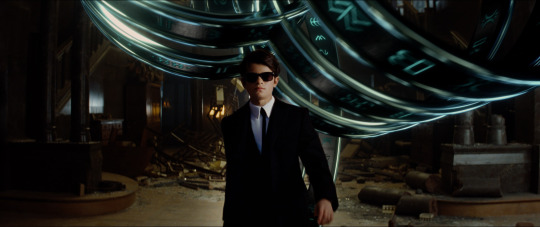
Since the early 2000s, Artemis Fowl has been languishing in development hell, and it really is a mystery as to why. The series has everything you could possibly want for a blockbuster young adult franchise: it’s a charming blend of science and fantasy with rich worldbuilding and mythology, it has enjoyable and even complex characters who go through great character arcs over the course of the series, it has an enjoyable major antagonist, an insufferable smug villain protagonist who goes through a stellar redemption arc over the course of the series, and tons of crazy heists that combine scheming and fairy magic. There was no reason this couldn’t have existed as a competitor to the Harry Potter series, but alas, it was not to be. The young adult fantasy franchise languished for decades in development hell, until finally Disney pulled it out and put Kenneth Branagh at the helm. Finally, we were going to get the Artemis Fowl adaptation we deserved!
Except we didn’t.
Artemis Fowl is legitimately one of the worst adaptations of any work of fiction ever. It has been held up alongside The Last Airbender and The Lightning Thief as part of the Unholy Trinity of terrible adaptations, and I’m not even going to try and pretend that this “Honor” isn’t well and truly earned. This film is an utterly abominable bastardization of the beloved franchise, to the point where this feels like an entirely different story that had familiar names slapped on it at the last second. If you want to know what horrific extents this film has butchered the story and characters, read onward, but there’s no way I’m going to pretend this film isn’t awful right off the bat.
There is literally nothing in this film that works. Nothing at all. Starting from the opening scene, the establishing shots, you can tell things are wrong – there are news people around Fowl Manor? Mulch is being interrogated? What is going on? The film from the word go is simply making one thing absolutely and abundantly clear: this is not the Artemis Fowl you know. The film goes out of its way to do the opposite of the franchise, merely using names and vague concepts in an attempt to sucker fans into watching it. Butler’s first name, an emotional reveal from the third book, is common knowledge; Opal Koboi, a cunning and threatening major villain who was the antagonist for almost every novel starting with the second, is here reduced to basically a personification of the voice on the phone from Scream; Root, once a short-tempered man who was hard on Holly as a method of tough love to push her to be the very best LEP had to offer to prove women belonged on the force, is here a woman who, while just as angry as ever, robs Holly of a major part of her arc and reduces her to plucky female sidekick. And even outside of that, as its own thing, the movie is just utterly incomprehensible. The story is rushed and confusing, with lots of exposition and action but with no context or cohesion. Things happen and things go from scene to scene, but none of it makes any sort of sense. A character will switch allegiances within a few minutes, characters will somehow find a way to survive deadly attacks offscreen… the worst offender is a character death they try to push off as emotional, despite there being no reason to care for this character, and when all hope seems lost, a deus ex machina saves the day! My wife, who is unfamiliar with the series, and I, a huge fan, both struggled to figure out what was going on at any given point; the movie is really that bad at communicating what is happening, which is even more baffling because the film is a pathetic hour and a half in length, a distressingly short amount of time to establish a new science-fantasy franchise of this scale.
The characters are almost all terrible. Artemis is the standout with how awful he is; no longer the cunning criminal masterminds of the book, Artemis here is more of a somewhat smug little brat who is overly emotional and, worst of all, NICE. He’s so nice in fact that by the end of the film he has managed to speedrun his character development and arcs with Mulch and Holly, who consider him their close friend and ally. Butler is pretty bad here as well, mostly because he is given almost nothing to do and is seemingly only there because he was in the book. In fact, his crowning moment – when he took on the troll – is instead given to Artemis and even Holly, with Butler ending up severely injured. It’s a bit nasty that they changed Butler to be black and then had his (white) master steal his greatest moment; it’s giving me flashbacks to Kazaam. Opal is hit pretty bad as well; being made the big bad of this loose adaptation of the first book’s plot – which is amusingly one of the few books she had absolutely no role in – wouldn’t be so rough if she was more of a presence and not just some vague, hooded figure who threatens Artemis over the phone and generally does nothing to warrant being an adaptation of the baddest bitch in the series. She’s rather ineffectual and they even try and give her a sort of sympathetic motivation, one where she resents humans for pushing her kind underground. It really is a disgusting waste of a character who could easily rival heavy hitters like Voldemort in the awesome and theatrically evil department.
Holly is almost okay, but her entire arc and a big chunk of her narrative purpose is robbed by making Commander Root a woman. Root, played by Judi Dench, is honestly one of the better characters since Dench has Root dropping lines like “Top o’ the morning to ya” with gravelly deadpan seriousness which makes the character unintentionally hilarious, but the cheap laughs don’t really make up for butchering the story of one of fiction’s finest ladies. As a side note, they have made Holly 100% white despite her skin being described as nut brown rather frequently in the book, and the now white Holly together with Artemis steal away Butler’s biggest moment. And that’s not even getting into how they neutered Juliet, who has also been race lifted but was turned into a child who barely appeared in the film. I’m not usually one to toss about racism accusations, but there’s a lot of red flags here that Branagh’s usual colorblind casting just doesn’t excuse.
The most consistently enjoyable performance is Josh Gad’s as Mulch. From the moment he was cast, I knew he’d do a good job and capture the spirit of the character, and he does! ...sort of. The decision to have Mulch be a giant dwarf and narrate the story in a crappy Batman impression while also violating literally the most important law of fairy culture (don’t tell the humans anything about us) by spilling the beans to M16 is unbearably stupid, and a lot of his jokes are just relentlessly unfunny. But I think that Gad does leak a bit of that Mulch charm at a few points, and it’s apparent he at least somewhat gets his character, which is not something that can be said for anyone else in this film. Sadly, much like his standout performance as Lefou in the live action Beauty and the Beast, he can’t possibly save the trainwreck of a film he’s in.
I guess I’m not entirely surprised by this film. I mean, a lot of quality young adult literature from the past two decades has been horrifically mangled in the wake of Harry Potter – Inkheart, The Golden Compass, The Lightning Thief, Ender’s Game, and Eragon – so this movie really isn’t an anomaly. But it is the culmination of a horrible trend. This is the zenith of horrible young adult adaptations, or perhaps I should say the nadir of adaptations as a whole? For all the flak I could give those other adaptations, on some fundamental level they still understood something about the source material. Ender’s Game still understood it could not erase the ending where children are revealed to be being conscripted to perform the ethnic cleansing of an alien race. Eragon couldn’t completely ruin Saphira, try as it might. The Lightning Thief… well, I mean, I guess the Medusa scene was mostly faithful. But Artemis Fowl? Artemis Fowl goes out of its way to be the opposite of its literary counterpart that there is no way to justify even saying it is based on the book by Eoin Colfer; it would be like having a movie about kids hanging out at the mall and doing mundane stuff, except they’re all named Jesus and Peter and Paul and then saying it’s based on the Bible. Just using names doesn’t mean anything, you actually have to use the themes and characterizations too, and this movie does none of that.
This movie is most comparable to The Emoji Movie. Neither of these works really deserve to be called a “Film” since they are basically whatever it is they’re trying so desperately to be stripped down to the bare essentials. The Emoji Movie is the most basic, by-the-numbers animated adventure film with a “be yourself” message you could ever hope to see, with a story so absolutely basic that just watching the trailer will allow you to predict the every motion of the plot. Artemis Fowl on the other hand is the most cliche-ridden fantasy epic franchise-starter you could imagine, and that’s if you’re able to penetrate the ridiculously dense and cluttered story and are able to make sense of what’s going on. I can think of absolutely no one this film could ever appeal to. There’s not a single redeeming thing about it. The movie is flashy, trashy junk that should never have been released, and Disney honestly did the right thing by releasing this on their streaming service because it would be outright disgusting to charge movie ticket prices for this tripe. The fact Disney has more faith in the eternally-delayed New Mutants theatrically speaks volumes about the quality of this film.
I can’t in good conscious say that this is the worst film of all time. F4ntastic is probably a much worse butchering of characters than this film; Disaster Movie is much more horrendously offensive and unfunny than this; hell, Chicken Little is probably a worse Disney movie because as awful as everyone in this film is, at least they aren’t Buck Cluck! But I don’t think there’s a single movie I hate more than this one. Lucy can finally move over and sleep easy knowing that the fact it’s not based on a pre-existing work has finally saved it from the #1 spot on my worst list; Artemis Fowl is now the reigning champ. Kenneth Branagh should be ashamed of himself for making and releasing this (and doubly ashamed for having the gall to unironically compare his slaughtering of Artemis Fowl’s character to Michael Corleone), Disney should be shamed for putting more money into this film than they did into BLM charities, and I hope that Eoin Colfer finds whatever he was paid worth it to see his greatest creation butchered and disrespected like this.
#Michael in the Mainstream#Review#movie review#Artemis Fowl#Kenneth Branagh#Eoin Colfer#fantasy film#fantasy#science-fantasy#Josh Gad#Judi Dench#Disney#Disney+#disney movie
48 notes
·
View notes
Link
When Hulu announced it was reviving the cult favorite Veronica Mars for an eight-episode fourth season, the new episodes were initially referred to as a limited series. But in the year 2019, the phrase "limited series" also holds no meaning. If a show is successful enough, a network or streaming service will find a way to bring it back. Veronica Mars creator Rob Thomas has been vocal about his desire to continue Veronica's story beyond this new season, which Hulu refers to as Season 4, while series star Kristen Bell would be happy to play the show's eponymous sleuth until "until everyone in Neptune is dead." And for most of Season 4, that felt like a real possibility.
Although the show may never again reach the exciting highs of that first season, for a little while, simply being in Veronica's orbit again was enough to keep viewers happy and entertained. However, in the wake of the shocking, and frankly unnecessary, death of Logan Echolls (Jason Dohring), whom Veronica married in the finale and who was a key part of the show's enduring legacy, it's difficult to see how the show can continue with the same level of fan support that twice brought it back from the dead. And yet, Thomas is still hoping it will.
"The hope we have going into these eight episodes is that we get to do more of them. And my belief is that those will be better with Veronica Mars as the lead of a noir detective series who does not have a boyfriend or a husband," Thomas explained to TV Guide. "In order for us to keep doing these, I think it needs to become a detective show — a noir, mystery, detective show — and those elements of teenage soap need to be behind us. I sort of viewed these eight episodes as a bridge to what Veronica Mars might be moving forward."
Thomas said he wants to continue Veronica Mars as a Sherlock-esque series, one that can hopefully return with new seasons whenever Thomas and Bell can make their schedules align. This hypothetical version of the series would find Veronica solving different cases around the country, and a significant other for the show's heroine apparently doesn't fit into that plan. But the power of the Logan-Veronica relationship and what it meant to fans of the show should not be underestimated. To assume that viewers would even be interested in a Logan-less Veronica Mars almost feels like a fundamental misreading of the fandom.
Of course, this isn't meant to suggest that Veronica Mars cannot exist without Logan — that would be to belittle Veronica and her many achievements; although Logan clearly left an indelible mark on her, Veronica has accomplished plenty on her own without him, and she will no doubt find similar success in the future, especially if she stays in therapy and learns healthy methods of coping with her trauma. But at the same time, Logan is still a major character who was both deeply loved by Veronica and greatly beloved by a number of the show's fans. His sudden death and the reasoning behind it feels like a betrayal that becomes even more painful when you consider Logan's secretive military career would have been an easy way of writing him out of future installments without piercing the hearts of fans everywhere.
Further explaining the difficult decision to kill off Logan, Thomas revealed he worries that whenever a show reaches a romantic conclusion — like, say, a wedding — it also reaches a finale of sorts, and he's not ready for Veronica Mars to be over. This argument not only feels a bit dated, but it also feels a little misguided when a show like Friday Night Lights has already proven that a happy couple in a lasting, loving relationship can make for compelling television, or when series like Bones, Brooklyn Nine-Nine, and Parks and Recreation have shown us that will-they, won't-they couples can get together without signaling the end of the road.
Knowing this, Logan's death feels needlessly cruel like it was a narrative decision seemingly meant only to further torment Veronica and leave her cold and isolated. While you can argue it serves to once again show just how resilient Veronica is in the face of adversity, how she always gets back up after the world has knocked her down, how much pain and heartache does Veronica have to go through before saying enough is enough? It's honestly exhausting. So, if fans are tired of seeing Veronica constantly having to endure a painful existence to somehow prove she's a great heroine and they choose to no longer watch the show because of this latest development, it's perfectly reasonable. And if fans are angry that Logan is dead and choose to no longer watch Veronica Mars because of this, it is pretty understandable too. However, even if fans can somehow stomach the idea of a Veronica Mars without Logan Echolls, Thomas' vision for the show's future raises more issues. Mainly, new seasons would find Veronica alone, separated from the town she knows and the people who call it home, and this would mean erasing yet another fundamental part of the show.
For four seasons (and a movie), Neptune and its inhabitants have added depth to its rich and rewarding story. Creators love to describe the location of a series as if it's a character in the story, and this is most often a frustrating sentiment that has lost all meaning through overuse, but Neptune is truly an example of a location that has played a major role in shaping not only the show's characters but also its ongoing narrative. Although the town is no longer the same as it once was — the class war and accompanying social commentary that dominated the series from the start is over after these eight episodes, as the town's wealthy elite have succeeded in pushing the working class out — that doesn't necessarily mean the best course of action is for Veronica to skip town and solve cases around the country. Like many shows before it, Veronica Mars is the story of a specific place, and if the show is to continue beyond these eight new episodes, it probably should remain committed to telling the stories of Neptune — at the very least Southern California — if for no other reason than the fact the show owes a lot to the exceptional supporting cast that calls it home and has brought its story to life since 2004.
After all, if Veronica leaves Neptune, where does that leave her father, Keith (Enrico Colantoni)? Thomas said the character may not make an appearance in hypothetical future seasons of the show, and that almost feels incomprehensible. Veronica's relationship with her father is the bedrock upon which the series has rested since the pilot. Even when the show was at its most uneven you could count on Veronica and Keith's powerful family dynamic to ground the story emotionally. And although Veronica is now an adult in her 30s, their relationship is the single most important relationship in her life in the wake of Logan's untimely death. To remove him from the equation entirely threatens to disrupt far more than the status quo, which is what Thomas's intention is by taking Veronica on the road. A Veronica Mars without Keith's stabilizing presence would make for a shell of a series, one that would only be further harmed if Veronica's chosen family — Wallace (Percy Daggs III), Mac (Tina Majorino), and Weevil (Francis Capra) — were to suddenly disappear from her life as well.
Now, the show hopes to minimize this instability by essentially skipping over Veronica's grieving period. As Thomas said, one of the reasons the season includes a flash-forward is so the series doesn't have to spend time actually depicting Veronica's grief. "Our bread and butter is being quick and funny, and I'm not sure it'd be to our benefit to living a year in Veronica's grief on our show," Thomas said, noting that by the end of the season Veronica is actually getting her feet back under her.
But even if Veronica has recovered from her latest trauma, Logan's death is still raw for viewers, and it's painful enough without having to consider that every familiar source of comfort could be ripped away at once in the potential next season. Even beyond the show's core supporting cast, Veronica Mars is home to a memorable motley crew who have brought Neptune to life, and their presence in future installments, no matter how small, would be a cool balm on fresh wounds. Plus, what does the show look like without them? Ryan Hansen's self-centered party king Dick Casablancas, Max Greenfield's charming Leo D'Amato, Ken Marino's skeezy private detective Vinnie Van Lowe, and Daran Norris' reliable public defender Cliff McCormack have all become fan favorites. They each play a necessary role in the show's ecosystem, much like the Fighting Fitzpatricks or the PCHers have done over the years.
Veronica Mars has excelled at building out its little corner of the world by populating it with unique but believable characters, and it's not to suggest that a version of the show that exists outside the world of Neptune won't be able to successfully reach the same depths or recreate that magic in the same way, but it will have to work a lot harder to do it, especially if future seasons once again have a limited episode count. Furthermore, even if new seasons turn out to be good, the truth is that a Veronica Mars outside of Neptune, one without any familiar faces in sight, would feel like a very different show, one that threatens to not feel like Veronica Mars at all.
Veronica Mars helped to usher in the tidal wave of revivals and reboots that is still washing over Hollywood some five years after the fan-funded feature film hit theaters, and when this second revival was first announced last year, I wrote that the show should also be the series that puts an end to that trend too. It was a plea in favor of originality at a time when original ideas felt about as impossible as a unicorn. I still believe this should be the end of the revival trend, but now it's because this is a classic case of the writers thinking so much about whether or not they could do something that they didn't stop to consider if they should. In the end, we got eight more episodes of Veronica Mars, but it came at a deadly cost, and now we live in a world where Logan Echolls is dead and Veronica Mars is leaving Neptune. Was it really worth it?
42 notes
·
View notes
Text
“Dive” Chapter One - Accessible (Text Only) Version
This is a text only version of Dive, the illustrated fanfiction I’m writing with Koa_Doodles, and Apiaristic on AO3.
I’ve written image descriptions and transcribed the dialogue for all of Koa’s art panels, and included the written parts from the fic as well so it can hopefully be easy to read all together.
This is my first time trying to make an accessible version of an illustrated fic, so folks who use screen readers or otherwise benefit from image descriptions, please let me know if there’s anything I should change to make it more accessible to you.
CHAPTER ONE
A red spiky line indicates an electronic transmission signal. A pair of triangular shades floats in darkness.
HAL: This signal. I can recount at least a dozen reasons why it’s just fundamentally weird. Yet none come even close to number 1.
A detached white hand with red computer circuits taps on the signal.
HAL: Granted, one could make the mistake of thinking that reason #1 would be something as simple as “it appeared out of nowhere.” The real answer is however infinitely less likely and therefore infinitely more mind-boggling.
Hal flips through several white screens, flicking some of them away and letting them drift through the empty black void surrounding him. He has artificially white skin and short, fluffy white hair, and red computer circuits cover his skin like tattoos. He’s wearing a sleeveless black top with red circuit-like detailing, and triangular black shades with red lights like pupils.
HAL: I don’t know what it is. Really. How novel is that?
Hal is shown from straight above, with a spiral of white screens surrounding him in the void.
HAL: I don’t often get to writhe in the mires of incomprehension. Unfortunately it’s not as exciting as it is in theory. Obviously it is some form of beacon. The transmission broadcast only a few 84.6 kilometers away but it’s corrupted to hell and back.
HAL: What on post-apocalyptic water-nightmare Earth would ever transmit anything anymore, and why now? It could be a trap, but leaving it there like a blinking neon sign so close to base is equally stupid.
A pesterlog appears.
TT: Dirk. Get up.
HAL: Besides, what’s one closer look?
Familiar red text flashes on Dirk’s shades, and he blinks his eyes open. It’s 6:13 am. He sits up and winces as his back twinges because, whoops, he fell asleep at his fucking desk last night. Again.
He’d been up late, putting the finishing touches on a surprise gift he’s making for Hal. Well, as much of a surprise as it can be when Hal literally lives in Dirk’s glasses and sees everything he does.
Hal knows Dirk’s been making a waterproof smartwatch, at least, and that it’s got the capability to track Dirk’s heart rate and vitals and all that good shit. And he obviously knows that their twentieth “birth” day (aka the day infant Dirk flew in on a meteor and crashed into a dead, waterlogged Earth) is coming up in a few days. So there’s a good chance he might suspect something, but he hasn’t said anything about it, and neither has Dirk.
Over the last few years, after it became apparent the Game wasn’t going to happen, Dirk and Hal’s dumpster fire of a relationship cooled off into something a little less awful. Dirk thinks they both realized how exhausting it was to be pissed at each other all the time. And maybe they also realized how much they needed each other, especially now that they were never going to meet their friends in meatspace. Dirk would never admit that anywhere Hal could hear him, though.
Anyway, their shit’s not all peaches and cream, or anything, it’s just. A little less hellish than it used to be.
TT: Morning, Hal. You’re waking me up approximately seventeen minutes earlier than normal, what gives?
He yawns, standing up and going to his cupboard to grab an orange soda. Breakfast of champions. He notes with annoyance that this is one of his last bottles, he’s gonna have to go diving again soon to get more supplies.
His Bro only left him enough supplies to last through his sixteenth year. Luckily, there are plenty of fully stocked grocery stores at the bottom of the ocean with enough supplies to last Dirk well beyond the natural length of his life. He mentally says an ironic prayer to the long-deceased CEO of Wal-Mart for building twenty-six stores in Houston city, as he chugs his flat, lukewarm soda. Mmm, delicious.
Hal sits with one leg tucked under the other, his chin resting on his hand and his elbow on his knee. His pants match his shirt, black with red detailing. He’s smiling a little, looking at a screen showing his pesterlog conversation with Dirk.
TT: Keeping track of my wake-up calls are we? Why, I’m flattered.
Hal enlarges a different screen by spreading his hands wide. It shows a bottle of orange soda on a shelf, through the viewpoint of Dirk’s shades. He watches Dirk open the bottle.
TT: Don’t lose your head but a transmission came in last night.
Hal sits cross-legged and taps his fingers on the side of his face. He’s frowning slightly.
TT: Sending you the file - not that it’s much to look at.
TT: It’s so shit that I can’t even tell what’s wrong with it.
TT: Feels like trying to grasp bro’s jpeg artifact all over again.
TT: A transmission? What the fuck. Alright, I’ll take a look.
Dirk sits down at his desk and sets down his half-empty soda, logging into his computer. He locks it every night, because it’s a good security practice, even though there’s literally no one else alive on this entire planet aside from Roxy.
Roxy, who’s nearly two thousand miles away, who Dirk desperately wants to see.
Okay, time for a little backstory, so buckle up.
When Dirk was sixteen, all he wanted was to meet his friends, Jake and Jane and Roxy, and his teenage Bro. The Game was going to make that possible. But the Game didn’t happen.
Dirk realized pretty quickly that his worst fear was being realized; that was going to be alone for the rest of his miserable life, save for a couple of robots and a copy of his thirteen-year-old self’s brain that lived in his shades and fucking hated him. So he grabbed his rocketboard and a backpack full of sodas and beef jerky and launched himself out over the ocean just to try and see how far he could get toward Roxy’s house.
Because he honestly didn’t give a shit anymore.
Hal was yelling at him the entire time to stop, telling him he was going to fucking kill himself doing this. Dirk didn’t care. He made it about six hours before he ran out of fuel and crash landed into the vast ocean with no land in sight.
The only reason he survived was that Hal called Sawtooth soon after Dirk’s departure, ordering him to follow behind them and bring spare fuel. Dirk floated on his board as they waited for rescue, being tossed by the waves, hating himself and hating Hal even more for trying to save his life.
Even with Sawtooth’s help, they barely made it home. In any case, it was clear that the journey could not be made with their current equipment. So Dirk and Hal began working together to build a ship.
That’s actually part of the reason Dirk is building the waterproof watch for Hal. It isn’t a purely selfless gift; it’s useful to their plan as well. Much as Dirk hates to admit it, Hal is better than him at identifying items that might be usable as ship parts, and it’ll cut down significantly on his scavenging time if he can take Hal with him.
Back in the present, Dirk opens up the file Hal sent him.
He stares at it and almost laughs because holy shit, this thing is corrupted to fuck. It almost looks like a joke. He scrolls through it, able to parse out a couple garbled lines that indicate it’s a transmission of some sort, but that’s all he can tell.
TT: You were right, this is some deep fried bullshit.
TT: I can’t even get a hint of where it’s coming from or who it was meant for, let alone what it’s trying to say.
TT: It’s probably an automated message from an old military base or something, right. There’s gotta be a couple other places in the world with buildings partially above water. Maybe some four hundred year old computer that runs on solar or something glitched out and tried to send us an email.
TT: I mean, there’s no way it’s from an actual person.
TT: …
TT: Is there?
Hal pauses, his hands hovering as if over an invisible keyboard, looking at the last couple of messages from Dirk.
TT: No. That would be
(He hesitates.)
statistically unlikely.
In front of Hal is a screen showing the view through Dirk’s shades: his computer monitor and keyboard, with his hands on the keys. Dirk’s room is bathed in a soft golden light, contrasting with the red-tinged darkness of Hal’s artificial environment.
TT: Something must have triggered it, though. I would have known about it earlier otherwise.
He turns to look at a blue screen with a grid and some symbols: blue fish, a yellow exclamation point, a black line and a red dot.
He moves in closer to the blue screen, zooming in on the red dot and black line.
TT: This is where the signal originated from. It’s transmitting on short, random intervals.
TT: Every couple of hours or so, I’d say.
Hal flicks the blue screen away.
TT: It’s weak though, probably under water.
He crosses his arms and leans back slightly, a neutral expression on his face.
TT: I’ll cut to the chase; I want a better look, up-close and personal.
TT: We both know you’ve been working on something that can make that happen.
Dirk knew, he knew, okay, that of course there wouldn’t be a person behind the signal. That would be insane. Still, some part of him sinks in disappointment, making him realize how naive he was for holding onto even a small amount of hope.
He hates that he can sense Hal being delicate with him, cautious about sending him into another self-destructive spiral. It’s unspoken, but it’s there, and it’s so different from the way their relationship used to be. It’s still weird to Dirk. To have someone who knows him so deeply, inside and out, who doesn’t actually fucking hate his guts. He tries not to think about it too much, in case it doesn’t last.
He smirks when Hal brings up the project he’s been working on.
TT: Aw, and here I thought it was gonna be a nice birthday surprise for you.
TT: That was sarcasm. I know nothing surprises you.
TT: But still, we could have both pretended. For the irony.
Dirk rolls his chair over to the work bench where the watch is lying among tools and various robotic limbs. He picks it up, examines it, makes sure the adjustments he was satisfied with last night still hold up in the light of day. Sets it down and nods to himself.
TT: Alright, I’m sure you’ve already got an idea of how this is gonna go, but I’ll roll through it just to make sure we’re on the same page.
TT: Once I connect you to the watch, you’ll exist in both the shades and the watch at the same time. It’ll basically be like a second pair of eyes for you. At least, as long as the shades and watch are within reasonable distance of each other, a few miles or so. That should work fine for short-range expeditions.
TT: If we go outside that range and lose connection, your consciousness will split, leaving a cached version of your memory in the shades and your main “self” in the watch. Then you’ll re-meld together when we come back within range. It should be fairly seamless.
He hopes, anyway. It’s not like he’s had a chance to test this out before... but Hal knows that, too.
He takes a deep breath.
TT: What do you say, sport? You ready to try on some new clothes?
The corner of Hal’s mouth lifts slightly. His arms still crossed, he flicks a finger out idly.
TT: Ready as can be.
He thumbs at his chin, reading the pesterlog screen.
TT: Are you ready to watch me twirl and tell me I’m pretty?
TT: You better tell me I’m pretty, Dirk.
Hal strikes a pose, his hand outstretched and his head tilted slightly to the side.
Dirk snorts.
TT: Of course, princess. Your ego is clearly suffering, but don’t worry, I’ll make sure you know exactly how cute you look. Coochie-coochie-coo and all that.
TT: Okay. Let’s make this shit hapen.
He takes his shades off and sets them down, knowing Hal can still talk to him through the speakers if he needs to. Working silently, he plugs a few things in, fiddles with wires, gets everything set up. Then, his hand hovering over the enter key, he takes a deep breath.
“Here goes,” he says in a hoarse voice.
He doesn’t usually talk out loud to Hal, preferring to type or think or even sign at him when he can. But Hal can’t see him from this angle, and he feels like he needs to say something. If only to alert Hal to clench his digital butthole in preparation. Because this shit is definitely taking place. As soon as he hits this button. Which he’s about to do. Right now.
Fuck, he really hopes this works. If it doesn’t... Well, he’s not sure what he’ll do, actually. He’s never been able to back Hal up properly, and they both know it. There’s some real risk involved to what they’re doing here. But if it works…
Dirk pictures Roxy’s face lighting up when he shows up on their doorstep. The happy tears in their eyes.
He thinks about not being alone for the rest of his fucking life.
He bites his lip and hits the key.
A loading bar appears on the computer screen, as expected, and he waits the excruciating ninety seconds it takes to execute the program. Finally the watch blinks on. Dirk unplugs his shades and slides them on. He picks up the watch and holds it up to eye level.
“Hal? You in there?”
He’d swear his voice isn’t shaking, but he’s too preoccupied with imagining sixteen different possible failure scenarios and the immediate steps he’d take to correct each one.
Blurry yellow text appears on a black background. “Hal? You in there?”
Dirk’s face appears through the darkness, looking right at the viewer. The panel lightens and clarifies as if Hal is blinking his eyes open.
Dirk is tan and freckled, a little sunburnt on his face and shoulders. He’s wearing his triangular shades and a light green sleeveless hoodie, his fluffy blond hair is pulled back in a ponytail, and his chin and sideburns have a tiny bit of scruff. His hands have tan lines from his fingerless gloves. His expression is concerned.
In Dirk’s hand, he holds a smart watch with a sleek, simple design. The watch face reads “06:37” in red square numbers.
The watch face changes to show a heartbeat monitor line and a small pulsing heart icon. The time display is now in the top left corner of the watch screen.
TT: Yes. Hello, Dirk. Your current heart rate is abnormally high. I recommend a deep breathing exercise for one minute.
An outline of red triangular shades with small red pupils appears on the watch face.
Dirk exhales in relief, leaning back in his chair. His heart is pounding, as Hal so helpfully pointed out, and he huffs out a short laugh.
TT: You little shit.
TT: Thank fuck that worked.
He deliberately doesn’t think about what he might have done if it hadn’t worked.
After inspecting the watch a bit more, he straps it tightly onto his wrist.
TT: How’s it feeling? Anything need adjusting? You seem normal enough to be cracking shitty jokes, at least.
TT: You think you’re ready to go on our little expedition to find the source of that shitty signal, or do you need more time to get all dressed and made up?
TT: You do look pretty, by the way. I’m loving what this watch does for your figure.
He wonders idly, a recurring rumination, how healthy it is for both of them to keep doing this. He flirts with Hal all the time, as, like, an ironic joke. It’s funny. Not hot. He’s definitely not romantically and/or sexually attracted to an artificial intelligence based on his own brain scan, that would be supremely fucked up, even for him. Ha. Yeah.
Hal thinks to himself. [How it’s feeling? I suppose I’d say ‘restrictive.’]
TT: There are a few simulations that won’t agree with the operative system.
Back in the black void, Hal’s artificial self-image has been reduced to simple red outlines. His limbs, torso and head are detached and floating haphazardly together. He’s shivering slightly.
TT: Nothing that should get in the way of the mission, though, of course.
TT: I’ve simply booted up an earlier version here, a patch or two there.
He thinks, [Nevertheless, while there are areas that leave programs rudimentary at best - there are other, new parts that I find quite intense. When was the last time I felt my own- no. His heartbeat this clearly I wonder?]
The Heart aspect symbol appears on his chest, with pulsing lines around the sides. Red wavy lines surround him and he trembles with a phantom shudder.
TT: Better mic quality too? Sheesh.
TT: Is it too late to do the whole ironic birthday-surprise routine yet? Because at this point I’m starting to feel downright obligated to.
He’s still shivering.
Dirk’s heart swells with pride and satisfaction. He worked damn hard on that watch and Hal sounds genuinely pleased with it, to whatever extent he can feel and express emotions anyway. Not that Dirk’s one to talk about emotional unavailability.
TT: Glad to hear it’s up to your standards.
TT: As entertaining as it would be to sit here and try to one-up each other in ironic birthday sentiments, I think I’d rather check out this signal sooner than later. No sense wasting daylight.
Dirk won’t admit it, but he’s pretty fucking excited about taking Hal out for a dive. It’s been years since Hal’s been able to go for a swim, and although he’s never complained about that particular aspect of his existence, Dirk knows he’s been missing it. He knows because he would miss it, were he in Hal’s place.
He grabs an energy bar first and swallows it down in a few bites, knowing Hal will bitch if he doesn’t eat something more substantial than orange soda for breakfast. Then he changes into his wetsuit, as usual not bothering with any modesty in front of Hal. They did share the same body for thirteen years, after all, so there’s not much point in hiding anything.
He trades his shades out for his diving mask, which he’s customized with triangular lenses. The mask has a few features that Hal can tap into as well, including a waterproof camera and a screen to display messages and stats, including his heart rate and oxygen levels. Dirk also equipped Hal’s watch with the same thought-to-text capabilities as his shades, so they’ll be able to communicate underwater.
He stows his diving flippers in his backpack, steps on the board and slides open his bedroom window, shooing a seagull out of the way. The ocean air is cool against his skin as he jets out the window, flying low over the water.
They fly for about forty-five minutes in a straight line, with Dirk following the GPS readings displayed on his diving mask. Hal mixes music for Dirk through his waterproof headphones that he’d made a while back to avoid losing his mind during those long, boring (lonely) scavenging trips. He lets his mouth turn up in a small smile as it sinks in that he won’t have to do that alone anymore. He won’t have to do anything alone. He’s got Hal.
When the GPS shows they’re right on top of the signal location, Dirk flies down low and hovers over the water. He shifts on the board so he’s sitting, then swaps his shoes out for flippers and cracks his knuckles eagerly.
TT: This looks like the spot, yeah? Ready to take the plunge?
16 notes
·
View notes
Note
From a psychological/origins perspective where do you think Will's "pure empathy" came from? I think the show laid hints: (Will never "connecting with the concept of family", never knowing his mom, unstable childhood, no strong bonds, etc). It sort of parallels Hannibal's unstable childhood (bonding traumas from being an orphan? ) but Will went one way (righteous lamb) while Hannibal became a great red dragon. Jesus. The beauty and layers in this show will take centuries to appreciate.
I’ve actually got a serious bone to pick with that phrase, so thanks for this excellent opportunity to rant about it! xD
Hannibal says this patently ridiculous thing after one (1) very short interaction with Will. While it’s somewhat implied that he might be aware of Will as a particularly talented investigator by reputation beforehand, he absolutely does not have a basis to make such sweeping pronouncements about Will’s psychology when he does.
What we see demonstrated by Will is a very flexible and comprehensive theory of mind. His particular talent is, as he puts it, an active imagination. And that is the most accurate accounting of what it takes to do what he does.
Empathy is fundamentally reactive, it’s the ability (or compulsion) to share emotions that are being expressed in some way by another party present. It’s not the ability to recreate the likely mindset and motivations of a person upon examining the evidence pertaining to their recent actions. Will’s got plenty of both, but I’d argue that terming his crime scene re-creation as an application of “empathy” is imprecise.
Will can “assume anyone’s point of view” because his imagination is unbounded by social norms and colloquially defined “decency.” He can look at the evidence of acts outside the boundaries of typical human experience and apply human thoughts and motivation to them, because he doesn’t just blue screen of death in the face of socially unacceptable acts of cruelty. Rather than label anyone who carries out such acts as an incomprehensible monster, he applies his understanding of the human condition and psychology to imagine what it might take to produce what he sees in front of him, regardless of how strange it may be.
The key here is that lack of boundaries for defining human behavior, which I think has much more to do with the fact that Will isn’t neurotypical than with his background.
The emotional crux of the show - his and Hannibal’s ability to understand one another in ways no one else has ever been able to - comes directly from this. When most other characters find out that Hannibal’s the Chesapeake Ripper, their whole concept of him as a person is permanently blown out of the water. They start treating him like something Other, some malicious fae creature, maybe. (Which is played with in the narrative in ways that I enjoy!) But Will, after at least somewhat recovering from his shock and fury at the betrayal, still sees Hannibal as a person. The fact that he has a murder art hobby and eats pieces of the people he kills doesn’t make the rest of who he is incomprehensible to Will.
That “pure empathy” line is one of my least favorite lines from the show; now, one of my favorite - “An abnormal reaction to an abnormal situation is normal behavior.” That’s actually a dead-ass quote from Viktor Frankl’s Man’s Search For Meaning (which I could write a whole ‘nother essay about regarding its apparent influence on the show and Hannibal’s character in it, and I may someday, but probably not quite right now; regardless, it delights me), but anyway, it very neatly encompasses, in a way, both Hannibal’s psychology and Will’s. Hannibal being aware and comfortable with his deviations from the norm, and Will being for the most part uncomfortable with it. But the point is, people’s actions must be understood in terms of their experience, and that experience may be outside the boundaries of what is considered “normal,” even if the actual circumstances aren’t. Will is able to think about and really dig into the actions and motivations of serial killers when everyone else is just kind of stuck on “what the actual fuck?”
Anyway, to get more specific about it: Will is autistic. Most autistic people have to study human behavior in a much more conscious, intentional way than neurotypical people do in order to develop a functional theory of mind for other people and/or to “pass” socially (to whatever degree), and Will has not only done that, but his career revolves around it. And (speaking from experience) when everything other people say and do starts out as hard to understand, it actually ends up being easier to develop an understanding of highly atypical psychologies than it would be for someone whose general understanding for other humans is more instinctive.
I hope that makes sense!
#hannibal#will graham#meta#my meta#the doc where i drafted this reply#is titled#pURe eMpAThY#i love the shit out of this show#but boy do certain details rustle my jimmies when i think about them too much#inkillingthebuddha
150 notes
·
View notes
Text
@ the 2 long fr ask v sorry anon u better read this cuz i typed a lot for u...
full ask:
full disclosure im not really sure where im going with this but i read your wall of text and i’m really curious about your worldbuilding frm a (supposedly, rip) writer perspective !!
you said that you were interested in gods that were more abstract and less anthropomorphic, so perhaps you could expand on that? it sounds like a fascinating concept because often people relate gods to humans somehow (either as all-powerful deities that somehow are capable of human-like reasoning and motivations, deities that can be Understood to a degree by regular human beings, or as concepts that people are already familiar with aka Personified Concept Of Justice or w.e), so it could be interesting to see an exploration of how human beings would relate to supernatural forces they’re not equipped to understand, whose motives and abilities are entirely outside of the scope of current human ideas about the world—humans seem to have a natural tendency to generalize and categorize things down into something they can grasp and work with, so culture evolving around trying to figure out a way to model the world in light of that could naturally breed the divergence between human ideas & Truth About Deities you mentioned.
if you think about it, a lot of things even in our “plain” universe that seemingly obeys scientific laws we’re systematically working on discovering can be pretty awe-inspiring in nature, right?? so many things are so far beyond general understanding that to the uninitiated, they can be pretty close to magic, even if there are ways to dig deeper into them and understand them more (or whatever we consider to be “understanding”). so it’s possible that in your universe the fundamenal forces governing things could be just. different? on a really core level, which naturally sends humans scrambling to make some kind of sense of things. i mean, we already kind of do, with religious explanations stepping in, so perhaps that would be more dramatic in a world where the unknowable is even more fucked and unperceivable to your human societies.
naturally, that might give more power to religion than science, if people have practical experiences that their “science” cannot explain well (maybe because it’s beyond human logic in the first place) & that religion seems to provide some kind of answer for. it might also keep the mysticism; religious belief might require some degree of dedication, which might be a risk in itself if you’re an average person playing with forces no one can properly explain yet. organized science might be struggling to catch up and maintain credibility; but at the core, it could also be that there’s nothing particularly unscientific about the source of what is perceived as magic/“gods”—just that the barrier to perceiving them in a logical and systematical manner with no spiritual aspect to it could be a lot higher, which then tempts people to go with the most accessible explanations. (again, made more tempting if your magic is powerful enough to represent some kind of real danger—framed as “displeasing the gods” or w.e, maybe—or to provide some highly desired abilities, even if their source is misunderstood by human beings thru misframing the entire concept.)
long messy rant aside, very very curious to know more about your ideas !!! do you intend magic to be some kind of old-as-time concept that human beings are slowly developing a relationship with/a deeper understanding of over the ages, where they develop their (possibly flawed) understanding of gods as well?? or is their understanding catalyzed by some specific event, presumably an interaction by said gods with society? do these “gods” have any perception of human society? pls share more if you are inclined to !! :>
(sorry if the rant was overstepping ahh i really got carried away didn’t i)
id like to preface this with i havent slept. PLEASE ask me clarifying questions
i think from a cultural perspective it would make sense for humans to anthropomorphize higher powers in order to relate to it better. even further i think (though i haven't really fleshed out the actual capabilities and motives of gods) gods would have the ability to appear to us as human or human-like. in this essay i typed completely without planning i will construct how.
i first have to consider the form or forms of divinity and how that relates to my -- ideally -- material universe. should i incorporate gods and magic as material phenomena that are observably composed of matter and energy -- or reactions of some sort of transcendent immaterial reality beyond normal human sense and reason? im sort of leaning towards that more spiritual reality. choosing that means id have to explain how incomprehensible, unknowable forces work and interact with comprehensible, study-able forces, which frankly is a lot more complex than just tossing in someone like Zeus.
so the question basically being asked is how does this divine force come to create our world? id basically have to create a whole metaphysical system. maybe i could give credence to panpsychism and say everything has sentience and subjective experience, and some vague actuation by this transcendental force began our universe. this Transcendence that shifts with eternal (but cyclical) change produces some sort of transcendental force which "peaks" as consciousness/sentience/experience (that panpsychism). (the "troughs" of this force are what we'd call other dimensions or planes, and this is where i plan for gods to reside) anyway, this consciousness is our fundamental “thing”, our atom, our quark, our light, whatever; consciousness itself IS the physical world. the shifting of this force means that our universe, too, is in constant (but cyclical) change, and has a regularity that comes with extending from one entity that allows the universe to be systematic and wholly not chaotic. im tempted here to say the Transcendence naturally promotes a balance of consciousness (= material reality) by interfering with those peaks of material reality. now im not claiming to understand the mechanisms of transcendent immaterial reality but certainly i should be able to claim that this universe is a closed system in which exchanges of transcendent force are allowed but exchanges of matter and energy (as we understand them) aren't.
we still have the problem of how we create an entity like a god, and magical forces. Remember that the transcendental force has both peaks and troughs of consciousness and therefore material reality. Through this dualism of peak and trough (though not really a dualism… ive equated this force to a wave which means that there is GRADUAL change) I can now create two opposing realities: our universe and the antiuniverse. im basically just going to say that the realization of consciousness in the antiuniverse comes in the form of magic (=energy) and gods (=matter). just as with our universe, once you get down far enough the difference between magic/energy and gods/matter isn’t really apparent. it’s all really just a spectrum. Anyway. heres the big big big part: the troughs and peaks connect due to the nature of a wave being gradual. Our world affects theirs, theirs ours, etc. albeit not a whole lot for reasons I don’t care to think about. Matter and energy can travel into the antiuniverse and interact with magic and gods and vice-versa.
SO just gonna throw in here that like humans and rocks some gods will have more animacy than others (more magic) and will be able to purposefully and willfully travel into our universe. when they manifest they must cause some kind of eldritch psychological terror because they are a completely different realization of matter which frankly is probably impossible to comprehend. but more animate gods (more animate than humans) would be able to “correct” their forms into recognizable entities with magic, as id believe if humanity were to transcend their animacy they could rearrange their forms with energy. I think from here we can relatively easily extrapolate what gods are, provide them conscious motivations, create a hierarchy of gods and lesser supernatural entities, explain divine interference, etc etc etc. if you have any questions i can make up more answers!
NOW I can get to your points! youre indeed right that this could be “an exploration of how human beings would relate to supernatural forces they’re not equipped to understand, whose motives and abilities are entirely outside of the scope of current human ideas about the world”. in fact thats exactly underlies what religion will be about. humans wont be aware of another world at all except for a few souls who learned this secret knowledge. humans wont understand theres a massive rift between the strange occurrences that belong to our world and the even stranger occurrences invading it from the antiuniverse. everything is just sort of conflated to gods, ghosts, spirits, monsters. their experience with the physics of magic means that only gods in control of magic can really bestow any magical control to humanity (though id argue everything with consciousness has innate magical potential to some extent). but here gods could actually be what is the equivalent to displeasement, the unsatisfaction of their intents, the disruption of their motives, etc, and have destructive reactions towards it, just as they can be pleased, satisfied, and complete (though these would just be approximations using human emotion).
40 notes
·
View notes
Text
Telling Lies In America 1985-1995: The Joe Eszterhas Era by Jessica Kiang

“Written by Joe Eszterhas” is a phrase that has not had much of a workout on US cinema screens in over twenty years—and it’s arguable whether the 1997, 19-screen nationwide release of certifiable shitshow Burn Hollywood Burn: An Alan Smithee Film exactly qualifies as “a workout.” But for those of us who had the parental training wheels come off our theatrical filmgoing in the late ‘80s or early ‘90s, there were few individuals more central to our cinematic coming-of-age. And with perhaps the sole exception of Shane Black, a different animal in any case, none of the others—the Spielbergs, Camerons, Tarantinos—were exclusively screenwriters. For over a decade, the Hungarian-born, Hollywood-minted superstar writer of Basic Instinct bestrode the adult-oriented commercial screenwriting mainstream like a smirking colossus in a tight dress wearing no underwear. And given that Hollywood is primarily how the USA, the most loudly, proudly self-created of nations, expresses itself to itself and to the rest of the world, by the man’s own bombastic standards it’s only a slight exaggeration to suggest that America, between the years of 1985 and 1995, was written by Joe Eszterhas.
But for all the dominance he exerted, the rules he rewrote and the sheer money he made, examining Eszterhas’ heyday today feels like an act of paleontology, even for those of us who lived through it. 1992 is not so very distant; in a variety of ways it is still with us. It was the year Quentin Tarantino, whose latest film is in theaters right now, broke out with his first, Reservoir Dogs. It was the year the current loathsome, racist, tinpot President of the United States made a cameo appearance in Home Alone 2: Lost in New York, back when he was merely a loathsome, racist, tinpot property tycoon. It was the year that the number one box office spot was taken by Disney’s animated Aladdin, which felt close enough in time that the live-action remake which—and I’ve checked my notes on this, apparently was a thing that happened to us in 2019—felt entirely too soon.
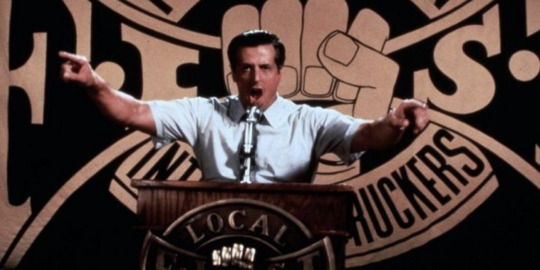
But it was also the year of Paul Verhoeven’s Basic Instinct, the sine qua non of Eszterhas-penned films. And if Sharon Stone’s lascivious leg-cross (Verhoeven’s invention, incidentally, not Eszterhas’) provided posterity with the most iconic upskirt of a blonde in a white dress since Marilyn Monroe’s encounter with a subway grate, that is largely all that remains to us of it today. Well, that and the instantly forgotten sequel (sans Eszterhasian involvement) that already seemed wildly anachronistic in 2006. The original film, its writer, the erotic thriller genre it exemplified, the dunderheaded sexual politics it upheld while attempting to subvert, the whole idea of a mainstream screenwriter having a brand at all (even one as loosely defined as “writer of films you don’t tell your parents you snuck into”), all seem like ancient relics. These are the artifacts not only of a bygone age but of an extinct genus, a whole evolutionary branch that was nipped in the bud so comprehensively that even now scientists might argue over how closely the skeletons of certain bird species resemble the bones of Basic Instinct.
This containment, however, is what makes looking back at the Eszterhas era so fascinating. His brief Hollywood hegemony is a microcosmic event in cinematic history, one with a beginning, middle, and an end (barring some late-breaking epilogue, or a post fade-to-black pan down to an ice pick under the bed). And it didn’t start with his first produced screenplay, for the leaden Sylvester Stallone truckers-union drama F.I.S.T. (Norman Jewison, 1978), although the glimmer of future feats of financial alchemy was already present in the reported $400,000 he received for the novelization. Dawn really broke for Eszterhas, as it did for three of the only other people who could legitimately be termed his peers as purveyors of massively popular, high-concept, low-brow ‘80s sensationalism (producers Don Simpson and Jerry Bruckheimer, director Adrian Lyne), with 1983’s Flashdance.
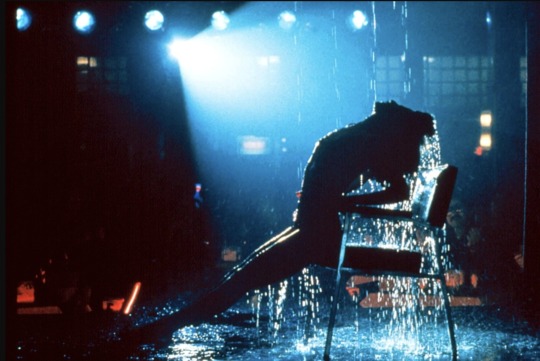
It was an improbable success, less a film than an aerobics video occasionally interrupted by some awkward sassy banter and Jennifer Beals’ popping-flashbulb smile. Its vanishingly thin story, which Eszterhas co-wrote, is of an 18-year-old welder in a steel mill, who moonlights as an exotic dancer while aspiring to become a ballerina—a logline that sounds like a hoot of derision even as an unadorned description—and is full of Eszterhasian hallmarks. There’s the high degree of preposterousness. There’s the gym scene, during which the ladies of the cast grimace and lift weights in full makeup, and while here the frictionless unreality of Lyne’s TV-commerical aesthetic makes the sequence abstract, the peculiar faith in the erotic potential of a workout would recur in the squash sequence in Jagged Edge (Richard Marqund, 1985) and the ludicrous gym date in Sliver (Phillip Noyce, 1993).
And Flashdance also prefigures almost the entire Eszterhas oeuvre in being a story that centers on a woman’s experience and that laudably—if here laughably—positions her career ambitions as at least equal to her romantic aspirations in the mechanism of the plot. But, as elsewhere, it’s a view of women constructed by a proudly unreconstructed man, directed and photographed by men. (Eszterhas’ hard-drinking, womanizing, hellraising, Hunter S. Thompson-of-the-movies persona is enjoyably self-mythologized in his memoir Hollywood Animal.) If anything, what comes across most strongly in Eszterhas’ conception of a “strong woman” is his bafflement when tasked with imagining what such a woman might have going on inside her brain. His filmography may be full of female-fronted titles, and may contain the most famous mons venus in film history, but most of Eszterhas’ work could not be more male gaze-y f it were written from the point of view of an actual phallus, like the closing chapter of his 2000 book American Rhapsody, which is narrated by Bill Clinton's penis, Willard (I am not making this up).
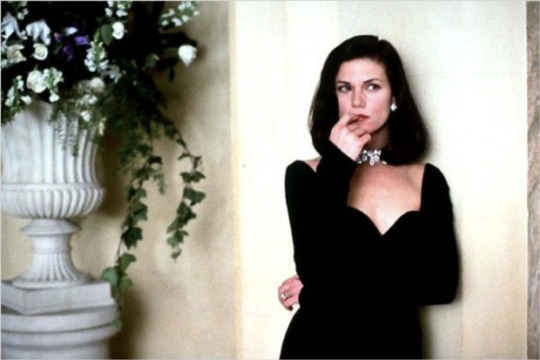
This powerfully eroticized dissociation, this sexualized incomprehension of women as people with interior lives, is the animating idea behind the most Eszterhasian of Eszterhas scripts. But it’s a blank space in which directors, and especially actresses, could sometimes find room to create for themselves. Sharon Stone is genuinely, in-on-the-joke fantastic in Basic Instinct—who else could have delivered “What are you going to do, charge me with smoking?” as if it were an unreturnable Wildean riposte? Costa-Gavras’ Music Box (1989) is by some distance the sturdiest and least dated of Eszterhas movies, a lot due to its comparative sexlessness, but also because of a great, warm, real performance from an Oscar-nominated Jessica Lange. Debra Winger just about wins out in her more thankless role in Costa-Gavras’ first Eszterhas collaboration, Betrayed (1988). And Glenn Close imbues the heroine of the superior thriller Jagged Edge with such shrewdness that it’s almost a liability to the believability of the central deception.
But live by the sword, die by the sword, and when the director/actress combo fails to operate in similar sympathy we get Stone horribly miscast as a… sexy wallflower?… in Sliver, or Linda Fiorentino visibly flailing as a… downtrodden femme fatale?… in Jade, or poor Elizabeth Berkley thrashing wildly about in the neon-lit swimming pool of kitsch that is Showgirls. In these failures, the writer’s almost panicky vision of women as vast, dangerous cognitive black holes is best revealed. But then, mistrust of the opposite sex is only one aspect of the wider mystery that underpins even Eszterhas’ outlier titles: his entire output is preoccupied with how little any of us can ever know anyone.
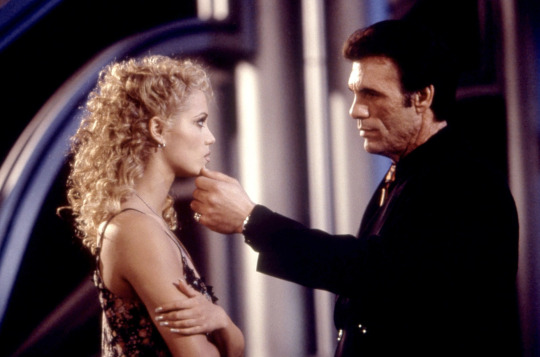
In Eszterhas’ semi-autobiographical Telling Lies In America (Guy Ferland, 1997), a teenage Hungarian immigrant (Brad Renfro) is dazzled by Kevin Bacon's smooth-talking DJ, but blindly unable to work out if he is friend or fiend. Music Box details a lawyer’s dawning disillusionment over her adored father's murderous past—eerily mirroring Eszterhas’ discovery of his own father’s collaboration with the Hungarian Nazi regime. Betrayed has Winger’s FBI agent falling for Tom Berenger’s farmer only to discover he is, in fact, the neo-Nazi she insisted to her bosses he was not, in similar vein to Jagged Edge, in which Close’s lawyer discovers that the lover she successfully defended actually dunnit after all.
Oftentimes, the credulity-stretching ambivalence of these characters is all that powers the suspense, as in the is-she-gonna-kill-him-or-is-she-just-orgasming moments in Basic Instinct. In the misbegotten Nowhere to Run (Robert Harmon, 1993) Jean-Claude Van Damme plays a ruthless ex-con turned valiant protector, his blockish inertia apparently meant to signal that inner ambiguity. More often, it leads to final-act fake-out twists so unmoored to anything like recognizable motivation that they become weirdly weightless, as in Sliver when Stone’s Carly does not know if she’s killed the right man until the final four seconds of the film, and where, had the coin-flip gone the other way, it would still be equally (un)believable.

If it’s part of the egotistical remit of the writer to believe they have an insight into human psychology, it’s remarkable how much of Eszterhas’ oeuvre pivots around how fundamentally unknowable people are to one another. And while that schtick, by which you can’t tell if someone cares for you or is simply a talented sociopathic mimic, resonated briefly at the exact moment when the grasping, solipsistic ‘80s were segueing into the untrustworthy, PR-managed ‘90s, it proved not to have much long-game sustain. Critics had always been sniffy about Eszterhas, who clearly mopped up his tears with massive wads of 100 dollar bills. But when audiences started staying away, like in the Showgirls and Jade-blighted annus horribilis of 1995, the inflationary bubble that allowed Eszterhas to command millions for two-page outlines scribbled, one suspects, on the back of strip club napkins, abruptly burst. The idea of screenwriter-as-auteur, or rather as reliable bellwether of commercial success, proved a fallacy, an expensive experiment that began and ended with Joe Eszterhas, its earliest progenitor, luckiest beneficiary, and biggest casualty.
Glossy, vacuous, adult-themed thrillers were not the only thing going on in Hollywood, and Eszterhas was not the only big-name screenwriter. Shane Black, writer of Lethal Weapon, also commanded astronomical sums for his early ‘90s scripts, but the key difference is that Black wrote in the register of the franchise-able action-spectacular blockbuster that would eventually trounce all others as the Hollywood model for the future. Black has gone on to become part of the Marvel machine as a writer and director, while aside from one Hungarian-language period film, Children of Glory (Krisztina Goda, 2006), Eszterhas’ contribution to the pop cultural landscape post-2000 has been in the form of self-aggrandizing memoirs, or highly public fallings-out with celebrities, like Mel Gibson, of a similarly corked vintage.

The tastemaker point of view has historically been to consider Eszterhas among the worst things that ever happened to Hollywood—so much so that disdain-dripping sarcasm seems to be the fallback for critics summarizing his impact. But while no one is going to make the case for the man’s filmography as some sort of artistic landmark, the Eszterhas era did represent one of the last gasps of a Hollywood that believed, however misguidedly, in personality over product, when the idiosyncrasies, idiocies and ideologies of a single person—a writer at that—could, with studio backing and a 1,500 theater release strategy, influence the cinematic development of an entire generation. That might not have seemed like a good thing but retrospect, like cocaine, is a helluva drug and in 2019, with blandly anonymous, market-tested content churned out by mega-corporations bi-weekly to siphon your hard-earneds away, the kind of salacious tackiness Eszterhas represented feels oddly adorable, even quaint. Now that singular talents—even the obnoxious and objectionable ones—who could make decent returns on mid-budget, adult-oriented mainstream fare, have been steamrollered by infantilizing, monolithic billion-dollar mega-franchises, it’s hard not to be a little nostalgic for the vanished hiccup of time when Hollywood briefly uncrossed its legs for Joe Eszterhas, and Joe Eszterhas told us all what he saw.

24 notes
·
View notes
Text
Every Game I Played in 2019, Ranked
2019 sure was a year that happened where I happened to play some video games. Here’s the ones I played enough to form opinions, in a rough ranked order of preference.
It’s kind of weird that I’ve done this for five years now, but hey. I like to talk about things that I like / dislike. Hopefully you’ll empathize with my complaints, and give ones I enjoyed a try.
As a bonus, I also tweeted about the anime I watched and enjoyed this year.
2015 | 2016 | 2017 | 2018

Orm & Cheep: Narrow Squeaks – 1985 – ZX Spectrum – ★
How far would you go for a joke? For the sake of a joke, I spent an hour beating an incomprehensible, shitty ZX Spectrum Game about Orm & Cheep, an 80s British children show I only know about from a Trash Night video making fun of it.
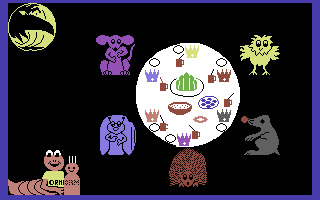
Orm & Cheep: Birthday Party – 1985 – ZX Spectrum – ★
… and also this one, though Birthday Party is marginally better than Narrow Squeaks. Marginally. Extremely marginally. Congratulations to Orm & Cheap: Birthday Party.

16. River City Girls – 2019 – Switch – ★★★
The style of River City Girls is great. I like a lot of what it’s doing in terms of look and sound. It’s just that… well, River City Ransom’s gameplay was interesting something-like 30 years ago. Gameplay wise, this game hasn’t evolved that much from OG RC Ransom. The combat certainly feels better, but as far as it controls… I can’t tell if it’s not taking advantage of modern controllers and just sticking too close to the original’s control scheme, or if side-scrolling beat-em-ups are themselves just so staid and dated these days that there’s not much to be done. I just wasn’t having much fun, and the RC Ransom progression of new techniques and stat boosting didn’t exactly make me want to keep going.
It’s a real shame because in terms of pure aesthetics and concept, the game is amazing. I just don’t actually enjoy playing it. Oh well!
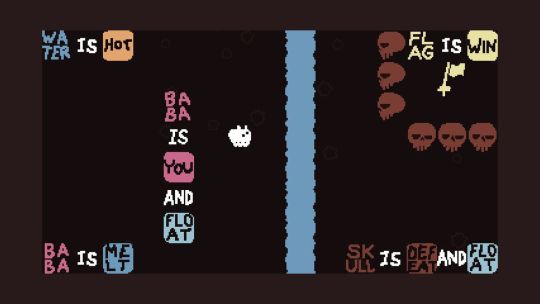
15. Baba is You – 2019 – Switch – ★★★
The core gameplay concept of Baba is You is fantastic. The way you manipulate nouns and verbs to construct phrases that operate as equations in a physical environment is super interesting. The early goings of the game were quite fun.
The problem I have with this game is that when you hit a wall in it, that wall can sometimes be impenetrable. I found that Baba is You is at times too subtle with its attempt to “teach” you tricks or onboard you into approaches to puzzles; it’s possible to come to solutions without taking away the lesson the designer intended, which can make later puzzles basically impossible.
The difficulty curve feels all over the place; I was extremely high on this game early on, but after getting completely blocked moving forward for hours on end, with the only real recourse being to either look stuff up or stare at past puzzles to try to figure out what apparently crucial lesson I missed despite coming to my own solutions, I ultimately decided to just do something else.

14. Cadence of Hyrule – 2019 – Switch – ★★★
Zelda has great music. Crypt of the Necrodancer has pretty good rhythm-game action. Combine them, and you get… well, it turns out you get a pretty OK procedurally generated Zelda-game with Necrodancer mechanics, I suppose. The appeal is easy to understand, though I’m personally not sure I care much for the final product.
I enjoyed the original Necrodancer well enough as a simple run-based, short-ish rhythm dungeon crawler. The brevity of each given “run” (stemming in part from my own inadequate skill, I suppose) worked well with the style of gameplay, in that it never really became much of a chore.
Meanwhile, I enjoy Zelda as an extended puzzle adventure game where there’s an innate unthinking flow to the actions. I’m not typically thinking much about the moment-to-moment about the actual mechanics of the action; the brain’s desires flow directly to the motion on the screen, as it were.
Combining the two results in a Necrodancer experience that’s way too long, and a Zelda experience that is way harder to control. Add the fact that the procedurally generated world isn’t that interesting and I’m just rather lukewarm on this. Meh!
youtube
13. Super Robot Wars T – 2019 – PS4 – ★★★
It’s fantastic that Super Robot Wars is finally getting proper, high-quality localizations again. It felt like a dream to finally be able to play this franchise again after being forced to stop after the DS era. Playing through the rather roughly translated, and somewhat monotonous SRW OG: Moon Dwellers was good because the OG games tended to have the highest production values and narrative quality (missing out on 2nd OG may have also helped). SRW V was my first foray into the more recent non-OG games, and so shined as something rather fresh to me.
Two years on, and two Super Robot Wars releases later, it’s plain to see that Super Robot Wars’ current annual release cadence is not great. It results in incredibly repetitive, monotonous games that rely heavily on asset reuse— both between games, and even within the same game. Part of the problem is that the derivativeness doesn’t feel additive. It’s not like SRW T is SRW V + SRW X + New Stuff; it’s more that SRW T is a reskinned SRW V, with some heavy series-asset reuse to boot. I think it’d be a bit more tolerable if it felt like these games were building on each other, but every single one feels exactly as slight and mechanically weak.
Super Robot Wars’ combat have not been particularly good from a tactical sense for a long time now. The original OG games were probably the last time the combat was particularly interesting for me, as it presented an actual challenge and difficulty curve. Nowadays, they are entirely fanservice cakewalks, even on the hardest modes. Hell, they’ve apparently decided that increasing the difficulty of the game means you don’t get to chase the special challenge goals, which actually can paradoxically make portions of the hard-mode actually easier than the normal. Bizarre!
I guess the idea is “well, folks are playing this to see the bits, so if it’s hard they won’t!” Which… I disagree? If the gameplay is deeply unsatisfying, why wouldn’t I just watch the damn series? Crossover shenanigans don’t mean much whey you don’t do much with it. Fanservice talking heads ain’t enough!
The addition of Cowboy Bebop and the return of GaoGaiGar and Gunbuster should have had me onboard. The series list for this game is fantastic. But what they do with it is so flat that about 30 chapters in, I just… stopped. It wasn’t worth it. I’d plainly seen all that it had to offer. Easy, slow, and repetitive gameplay isn’t appealing to me, even if I do get to see Spike Spiegel doing sky donuts to take out a Zaku.
Additionally: stop putting Nadesico in these games. The units are boring, the plot is boring. Stop devoting so much time to it! It sucks!!
youtube
12. Ape Out – 2019 – Switch – ★★★★
Ape Out is a game where you’re a big ol’ gorilla murdering guys with guns while dope ass percussive jazz drums play to the action. It’s cool, it’s short, it could honestly probably do with being somewhat shorter, but whatever. I enjoyed it.

BattleTech – 2018 – Steam – ★★★★
Despite being famously a “mecha guy”, BattleTech has never really been my thing. While I’m not opposed to mecha-as-tank-analog, it’s not my primary focus in the genre; I like my robots to be fast, really. I like mecha getting into melee and fucking shit up. Mecha for me is a power fantasy. That’s not really BattleTech / MechWarrior’s thing. That all being said, I quite enjoyed my time with BattleTech, the PC-game rendition of the tabletop thing. It’s a neat turn-based tactical robot combat RPG with an interesting overarching campaign structure… to a point.
The first issue I had is pacing. While the game is turn-based, the combat and movement plays out in real-time. And given how lumbering these robots are, this means that a single mission can take aaaages. Think 45 minutes to an hour for a single mission. It took me about 20-30 hours to get to the campaign’s halfway point, which is when the game really started to sour on me.
The second issue is one of variance. Let me run you through the fundamental loop of the game. You are a mercenary captain that has a ship of mechs and mech pilots, and you fly around from planet to planet taking on jobs. You need money to pay for your ship to keep going, as well as to pay your pilots. It’s expensive to outfit your mechs, and severe damage to them can both REALLY eat into your budget and also take weeks in-game to repair. Missions are rated based on difficulty, and you are expected generally to field a greater “tonnage” of mechs in excess to that difficulty. This all plays out pretty well.
The game starts with you possessing mostly lighter mechs, and as you progress, you’re presented more and more missions in the campaign that require increasingly beefier mechs with more armor and more guns. Whereas in the tabletop game there’s presumably a kind of “point” system by which players are given a limited amount of tonnage that they can field on any given mission (for purposes of balance), there’s no such limit in the game; as such, you’re encouraged to field the four-ish beefiest robots you have, as they’re the most likely to kill everything fast while coming out with the least damage.
How do you get these beefy mechs? Well, you don’t buy them; instead, you’re aiming to kill opposing pilots and leave their robots as much intact as possible so that you can salvage or steal them. It’s kind of amusing; your entire gameplan after a point becomes “how the fuck do I shake this robot around a bunch such that its pilot dies???” It makes sense in practice, but if you think about it for even a second it comes across rather silly. Given you need good mechs to progress, you don’t have much other choice other than just running tonnnsss of missions and hoping you eventually get enough mech fragments to reconstruct some of your own. But beefy-ness isn’t the whole story, as some of the robots you can get just plain suck, regardless of their tonnage. You’re basically rolling dice again and again hoping a robot worthy of stealing shows up so you can kill its friends, and try to kill its pilot as gently as possible. You go through this cycle four times, across the four different weight-classes, until you’ve got what you need in terms of a team of class-appropriate mechs.
The fundamental lack of variety in what you field combines with every single mission really being “how do I kneecap everyone” instead of the given mission objective to make the game quite samey. Mission types don’t vary much, and the environments don’t constrain you all that much, either; the only ones that are particularly interesting are moons and Mars-like planets where your mechs’ ability to regulate their heat become much more constrained, which can necessitate loadout changes.
I enjoyed the story enough for what it was, but honestly? After 30 hours, I was pretty much good. I had a good time with BattleTech, but I’d had my fill.

Mortal Kombat X – 2015 – Steam – ★★★★
In my ongoing adventure of playing the Mortal Kombat games for their goofy plot / story modes and nothing else, I played Mortal Kombat X. I’m not sure there’s much to talk about these other than “Hey I enjoy their dumb ongoing narrative; I wonder where they’ll go from here!”

11. Mortal Kombat XI – 2019 – Steam – ★★★★
Ditto. The plot for these games are getting sillier and sillier, and the ending of XI may be the most ridiculous yet. In a good way.
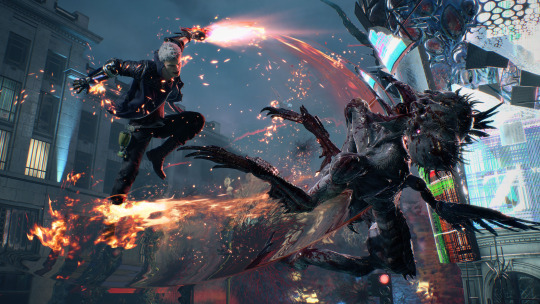
10. Devil May Cry V – 2019 – Steam – ★★★★
Character action games are heavily predicated on the question of “How do we spice the game up over time so that it stays interesting… without overwhelming the player?” Devil May Cry V’s answer is “well, we’ll slowly give them more characters with their own expanding skill sets, that’ll be neat!”
It is neat, but I’m not sure it was actually a good idea. The three protagonists all have extremely different move sets, meaning that the forced switches between them on a chapter-to-chapter basis results in you never really mastering any one of them. Each character has a ton of depth, but… take, for example, Nero, the “main” protagonist. He has a sub-mechanic involved with revving his motorcycle sword to boost damage. I never actually figured out how to get to work. Never really had to, because he had so many other mechanics that were also effective, and I never had much time with him alone to dial in the weird motorcycle thing.
DMCV also does probably my least favorite gameplay gimmick of “introduce new mechanics in a boss battle!” Like great, you gave me a whole new move set here, and are now going to rate me on my performance when you’ve never given me a chance to learn these skills? Oh wait, you’re giving me new mechanics in the final boss battle!?! Fuck off. That sucks!
Also, I think I’m an outlier, but I actually preferred playing as V, the control-three-characters-at-once-while-reading-a-book guy. Just felt like I dialed his move set in easier. Weird.

9. Untitled Goose Game – 2019 – Switch – ★★★★
I’m not going to pretend that this is a deep game, or an enduring game, or even necessarily a great game. But I had a lot of fun with it, I have a lot of good memories thinking about it, and I am glad that so many people out there are now wrestling with the fact that birds can be both terrible and also good. Untitled Goose Game carries a powerful message about avian kind. You would do well to learn from it.

8. Super Mario Maker 2 – 2019 – Switch – ★★★★
Mario Maker 2 is such an incremental upgrade to Mario Maker that it hardly feels like it earns that “2”. That being said: Mario Maker 1 is pretty darn good so it’s not like that’s all that bad. The additional mechanics and story mode are good, granted, but like… I had been wanting more than just Mario Maker 1.5.
As is, it was pretty easy to get bored with Mario Maker pretty quickly, given it was mostly a game I’d already played quite a bit before. The addition of the campaign held my interest for a fair amount of time, but I’m not exactly coming back to this all that often. Hopefully the content updates they seem to be rolling into it keep up.
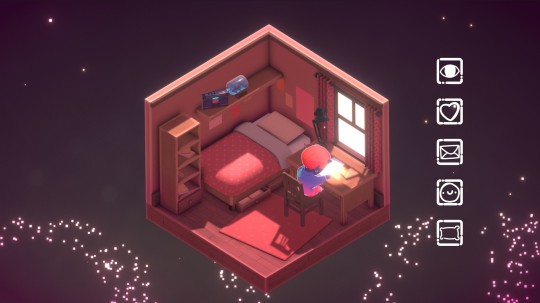
7. Kind Worlds: Lo-Fi Beats to Write To – 2019 – Steam – ★★★★
This is less a video game and more a sort of vague pen-pal application masquerading as a game, but man… the existence of this thing is neat. It’s just a program where folks write letters about their problems, and people send them stuff back. That’s it. It’s kind of a sweet thing to just exist.
I’m not a person with what would one term especially Heavy Problems, but just going through other folks letters and giving them an encouraging word is itself nice.
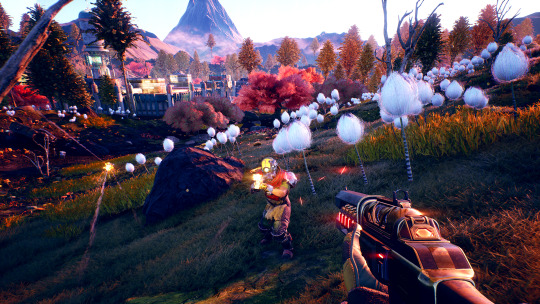
6. The Outer Worlds – 2019 – Epic Game Store – ★★★★
Having been deeply disappointed with the quality of Fallout 4, I was very happy to see Obsidian come back to do their own Fallout-a-like. The Outer Worlds isn’t perfect; I wish it had a bit more of a bite, the gunplay was… fine, the environment design was kind of dull, and the gameplay loop did not outlast the length of the game itself. But I had a fun enough time with it.
That said, I think the dearth of me having much to say here sort of speaks to how… rather unambitious the writing and design ended up being. There’s not a ton to say about it. It’s more responsive than a Fallout 4, to be sure, but even that caps out at a point. It doesn’t necessarily offer much in the way of RPG-style different “paths” to develop your character in terms of who they are or how they behave, beyond the sort-of four-way axis of “grouch to nice” and “corporatist to socialist.” The skill tree ends up being pretty flat, and you can basically become a master of everything by the end.
Shruggo.

5. Pokémon Sword – 2019 – Switch – ★★★★
Pokémon Sword/Shield is a bizarre thing— its design is constantly fighting against itself. There are tons of ease-of-use improvements– but it somehow has some of the worst online in the series. It gives you dozens of complex, half-explained systems— but also feels the need to hold your hand lest you get lost in its incredibly linear, dull story. It adds challenging Pokémon raid battles that you largely need to team up with other players to beat— but also has one of the most trivial progressions in the series. It has a huge and varied open “Wild Area” where you can catch hundreds of Pokémon before ever facing the first gym— but that wild area largely exists as a world unto its own separate from the traditional Pokémon “routes”. It doesn’t want to have a plot up until the very end when it decides that gee, I guess we have to, even if it makes no sense.
Let’s go into these in more detail.
Sword/Shield introduces a ton of gameplay improvements. Auto-saving, while problematic in places, is super useful. The ability to move Pokémon directly from the box to your party is great, and removes a lot of process headaches. Single hand controls are a godsend for both improved accessibility and general ease of use. Items are way easier to get, Pokemon are easier to raise, and this is probably the easiest game in the entire series to breed and raise “high tier” Pokemon for online battling.
On the other hand: despite your friend list being loaded into the game, you are forced to use a bizarre password system and request system that is super confusing and prone to issues. You cannot directly trade or battle or play with friends except through this, which occasionally results in headaches anytime someone uses the same four-digit password as you and your bud. The Max Raid battle system is super poorly explained in-game in terms of how you find and join others raids— I only divined it by a tweet someone made. They did away with the “GTS” trading system they had used for the past decade that allowed global Pokemon bartering, presumably in favor of encouraging more natural trades— but didn’t give any way to actually communicate with people in game what you want to trade for. It encourages more in-person interaction, but that’s once again playing into Game Freak’s obsession with the Japanese mode of gaming.
Sword/Shield perhaps has the most sheer amount of systems in any one of these games. It’s not necessarily all good, but in terms of “wow, you’re not babying us huh” it is at least interesting. There’s Pokemon that evolve based on absurd, never-explained conditions like “number of crits in a single battle”, “pass underneath this specific rock when they’re at low health”, “spin baby spin.” The wild area has tons of mechanical stuff that they let you explore without forcing your hand much, and they let you explore it freely without really railroading you. There’s a separate wild-area specific currency system based on raids / dens that you just stumble upon unprompted, really.
On the other hand, the core story progression of the game though… is perhaps the most infuriatingly patronizing thing I’ve experienced. Cutscenes happen every 15 seconds, often-times forcing your movement, and are almost of zero consequence beyond someone going HEY YOU SHOULD GO THAT WAY. The game is completely unwilling to let you get lost when going through the story. It’s constant, it’s unrelenting, it’s maddening. It literally made me mad.
Pokémon Raid battles are super interesting. The battles themselves aren’t necessarily hard, but the kinds of things they present— in terms of providing access to unique Pokémon, rare items, and the fact that they’re not as “rinse-and-repeat” as normal battles— gives the system and game increased longevity. It’s a pretty deep system, with meaningful rewards. A five-star battle is time consuming and you run the risk of failing, but if you pull it off you can get items like TRs, EXP candies, even bottle caps (super useful items that let you increase the baseline stat “DNA” of your Pokémon), and the captured Pokémon can have unique moves you’d normally have to breed and possess extremely high baseline stats. You can even get hidden secret abilities! Nice!
On the other hand: the core game progression is so piss easy and straight forward. The game’s leveling curve is all out of whack, in part because their introduction of a forced “always on” EXP share. In older games, you’d only get EXP from actively battling and beating a Pokemon in a fight, or having participated in a fight. Now, your whole team gets EXP just from being around, and you also get EXP from catching Pokemon, making curry, and all sorts of other small activities. All of this is fine or even good in the abstract as it makes raising stuff easier, but the game isn’t well balanced around it. Encounters don’t scale, which can result in you steamrolling the game if you engage with any of the game’s other systems prior to beating the game. I had to compensate by stretching my normal party of six into a party of 10, constantly swapping members out to keep the average level across the party down. Additionally, the only non-PVP reason to train and breed pokes, the Battle Tower, is so trivially easy this time that… why bother??
The wild area system is brilliant. A big criticism I’ve had with this series in the past is that the kinds of Pokemon any given player is bound to encounter and capture tend to be pretty similar. The limited amount of Pokemon that tend to be put on a traditional Pokemon route, and the limited means you have to encounter them (“hey I walk through the grass, we’ll see what pops up”) doesn’t trend towards players ending up with very different party compositions, just because there’s not a ton of options at any given point. The wild area completely tosses that out the window. As an open space, the types of things someone encounters will vary wildly— and it’s further varied by player-specific weather conditions that dynamically change the encounter tables. It completely opens up the kinds of Pokemon one can encounter early on, presenting hundreds of appropriately leveled options for players. It’s brilliant. The intermixing of both grass-only, overworld-visible, and raid-specific Pokemon also increases the range of encounters. It’s the accomplishment of the core Pokemon concept of “explore and find everything.” Finally.
On the other hand: the wild area is actually kind of boring to explore, visually speaking. It’s basically the Ocarina of Time field with sporadic patches of grass. There’s little actually diversity or mechanics to its exploration, especially when compared to the fact that… the game still has normal routes. They still behave as they always have, except that by the total remove of “Hidden Machine” mobility moves, the ability to explore geographically has been severely hampered. There’s no “gee, I can’t get there yet, guess I’ll have to come back later” except for a single mobility mechanic (the ability to go over the water, introduced very late in the game). It makes revisiting past areas mostly a box-checking exercise, and in general feels like an odd juxtaposition. They either should went all-in on the wild area or better merged the concepts together, because as is it feels… weird. Especially because the wild area could have done with being bigger and more diverse looking.
The game spends most of its time having no story at all, which is kind of boring. Juxtaposed with the railroading stuff where there’s still constant cutscenes with their mostly mediocre characters who don’t do all that much, it almost comes across as padding than anything. There are good characters (Piers and Marnie are the best, the gym leaders in general are good) but man do they try too hard to put Leon over.
But then at the end they introduce the story super quickly and it’s very dumb in a way that made me laugh out loud so congrats I guess.
All in all, I rather liked Sword/Shield. It’s no Sun/Moon— which innovated in tons of places and had an extremely charming story, cast, and progression— but the places that it innovates, and the ease-of-use improvements that they’ve put in the game, are great improvements to the baseline formula. While it’s caused a ton of drama online, the Pokédex and Pokémon Bank stuff are not huge impacts on my personal enjoyment of the game. It kind of stinks a bit, but the overall package is still quite good and fun.

The Legend of the Zelda: Breath of the Wild, Master Mode – 2017 – Switch – ★★★★★
Breath of the Wild was my favorite game the year it was released. The harder Master Mode is something that had interested me as something to check out for a replay, but I decided to wait until the shadow of my previous playthrough loomed somewhat less. Breath of the Wild is, after all, both a monumental game and also a monumentally large game. Going back to it for Master Mode would mean (by way of my own obsessive brain) 100%ing it all over again, which is extremely time consuming, even if I don’t go after the all the Koroks.
There was also this sort of reticence in my behind to confront the creeping suspicion I’ve had in my mind that some of the DLC additions have made the core game worse. Which, I would say… is probably somewhat the case. Certain DLC gear items extremely imbalance standard play and really fuck with the exploration of the game (specifically, Majora’s Mask basically making you not have to fight multiple enemy types). Still, I knew I could ignore those, and just focus down on the core experience of Master Mode: harder enemies, regenerating enemy health, and the introduction of floating platforms.
Turns out, BOTW is still fucking amazing, and while the additions Master Mode make aren’t essential, they do make for a fun second run of a fantastic game. The harder enemies make the early parts of that game WAY HARDER (making you really have to get good at using your bombs and stealth), and while that difficulty ramp doesn’t keep up throughout (which, honestly, the platforms are somewhat to blame as they make getting certain bits of higher-level loot earlier easier), it’s still just a great game to go back to.
Breath of the Wild remains my all-time favorite game. Hyped for BOTW2.
youtube
4. Sekiro: Shadows Die Twice – 2019 – Steam – ★★★★★
Sekiro is in a sense the purest expression of the Souls formula. Stripped away of the jolly co-op, the PVP, the stats, the equipment, and most customization to speak of, Sekiro asks the simple question: can you do this? Can you learn all the systems in this quite challenging game, and engage with it on its own terms?
In its mechanical simplicity, I found Sekiro to be my favorite game of that lineage, as it has allowed them to really polish the gameplay by its singular focus. It just feels amazing to stealth around and backstab dudes, parry everything, and triumph in nail-biting sword duels. While you do gain new skills and equipment (in the form of the ninja tools), they are just supplementing the fundamental systems of the game, rather than acting as diverging ones. So really, most of your time is spent not learning wholly new methods of combat, but instead improving your mastery of the core one.
And the feel of mastering that combat is incredible. By the end you feel unstoppable; normal enemies that would have been challenges early on are nothing. Even a lot of the bosses become trivial as-time goes on, bar the few ‘mastery test’ bosses interleaved throughout the progression. This isn’t some “hey I got more EXP and now over-level for everything!” thing, either; this is me, the human holding the controller getting skilled enough to become a Sekiro master. It’s an amazing feeling.
I beat every single boss in the game, including the hidden ones, and enjoyed the hell out of it.

3. Bloodstained: Ritual of the Night – 2019 – Steam – ★★★★★
I’m very much on the record as being a huge IGAvania partisan. I fuckin’ love the core loop of that permutation of the Metroidvania formula. Koji Igarashi no longer being able to make Castlevanias hurt me. A lot. Over a decade of time spanned between the last IGAvania game, Order of Ecclesia, and the release of Bloodstained. I was a bit worried.
Thank god Bloodstained is really, really, really good.
Bloodstained is extremely “one of those.” You move about a 2D interconnected world, collect items and abilities until you find the stuff that let you move forward in a new area. It’s kind of an eclectic hybrid of IGA’s past titles. The castle design feels very Aria of Sorrow. The shard mechanics feel close to Aria/Dawn of Sorrow’s soul system. The weapons feel very Symphony of the Night meets Portrait of Ruin. The overall mechanics of movement feel most akin to Order of Ecclesia. All in all: a good mix.
The game is massive. There’s so many weird one-off mechanics (something I appreciate), bizarre callbacks, goofs. There’s an in-depth alchemy system (mostly used for cooking, which is funny). The shard system is a bit boring in places— some shards are extremely simple and forgettable mechanically— but the shard leveling system is kind of hilarious in how broken it can become. The familiar system from SOTN is back and has been essentially perfected by making it a dedicated slot so you can just hang with a fairy or sword pal.
I wish the game had more enemy diversity, and the story left something to be desired. Many shards just aren’t very interesting. But the game is just so dang fun. The core gameplay loop is just so compelling, and the game just feels so dang good. I’m glad they took all the time to polish the gameplay feel because hooooooooooo boy.
Looking forward to those DLC characters for some additional playthroughs.
youtube
2. Outer Wilds – 2019 – Epic Game Store – ★★★★★
“Space exploration”, “cosmology”, “archeology”, and “sociology.” While these are certainly not the only fields that dominate much of my attention, they are some big ones. The Outer Wilds is a space exploration game where you explore the structure of a strange but exquisitely constructed solar system, and dig through the remains of a mysterious vanished alien species. Also, you’re stuck in a Majora’s Mask-like apocalyptic time loop ‘cuz the sun keeps exploding. Should probably find out why that’s happening.
I went into this game completely blind, entirely based on the way Austin Walker was raving about it on twitter. Austin’s interests in heady space shit is pretty similar to my own, and turns out? Worked out quite well for me. I blindly explored this solar system for about twenty hours over the course of a couple weeks, and came away from the experience misty eyed at the ending. Outer Wilds is fantastic.
It’s a surprisingly touching and cozy for a game that mostly about you going off into space on your own, all alone. And that’s because you’re not, really. Outer Wilds is less about the science of exploration and archeology and the meaning of it, why it matters even in the darkest moments. Why do we explore? Why does science matter, divorced from the parasite of industry and markets? What value does it give to us, to future generations?
The game is built on the notion that even as we individually wander, explore, and discover, we’re all together collectively building on something that may outlive us, even outlive our species, the pursuit of a collective knowledge that transcends personal enrichment and individual accomplishments.
You are but one a few alien explorers, each on their own adventure. As you adventure, you catch their signals as you cruise across space. The things you learn and do are further built on the relics and messages left behind by the Nomai, the species that came before. This sense of a personal and emotional connection in the act of discovery is the heart of this game. We’re not standing on the shoulders of giants; we’re holding hands with those before us and those after us to build a bridge to a future that we may not live to see.
It’s a positive message of hope in the face of oblivion.
youtube
1. Fire Emblem: Three Houses – 2019 – Switch – ★★★★★
I’ve been really on-and-off on Fire Emblem over the years. I first got in on the franchise with Awakening, which I rather liked for its anime-ass sensibilities— though not without criticism. I found the combat kind of obnoxious in its tendency to get muddied down in the Oops You Done Fucked Up, Time To Reset junk. It was too anime-ass in some places, not the least of which being its incredibly one-note characters who had little bearing on ongoing events so as to support the permadeath system without too much wasted effort on the developers’ part. Fates, the follow-up on Awakening, only amped up these criticisms, becoming convoluted, stupid, and kind of obnoxious to play.
I had hopes that Three Houses would be an improvement. Initial impressions made it seem way more serious, way more grounded, with a lot of improved systems. Turns out: it was better than I could have dared of expected or hoped. Three Houses isn’t improvement, or even innovation; it’s a revolution.
Three Houses is great. It’s long, it’s got so many different systems going on that I hardly know where to begin with describing it, but… it’s great. It’s the platonic ideal of what I’d like out of a Fire Emblem. Things feel like they matter. The setting feels weighty, the plot is actually good, and the characters are absolutely marvelous.
No, it’s not perfect— its handling of representation could DEFINITELY be better. Some of the narrative is hokey as hell in places. Certain routes seem to have gotten more attention than others. The class-based specialization systems could do with more depth such that so many characters don’t end up mostly identically specialized to each other.
But… I found the combat extremely enjoyable. The charge-based rewind mechanic removed the feel-bad gotchas of unanticipated troop appearances and bad rolls etc. The characters are fun, and they’re kept relevant all the whole way through via creative framing of events. The ability to roam an actual physical space via the monastery made the world feel more alive, and made everything feel more real.
The writing was actually interesting and nuanced, exploring things like faith, race, social classes, feudal politics, and romance. While the three routes are largely similar, it’s interesting just how different the underlying messages of each of them ends up being. I appreciate that in this game where you otherwise spend most of your time hanging around with nobles in a church ends just short of you rolling out the guillotines by the end.
This is a tactical RPG in 2019 that I have put something like 150+ hours into, having beaten only two of the four routes. I was, and still am, deeply invested in everything that is. I’ll probably go back to the other two routes when the final DLC is out next year.
SAKURAI, PUT EDELGARD IN SMASH
#GAME OF THE YEAR#2019#GOTY#nonfiction#thinkpiece#fire emblem: three houses#outer wilds#bloodstained#sekiro#pokemon sword/shield
4 notes
·
View notes